






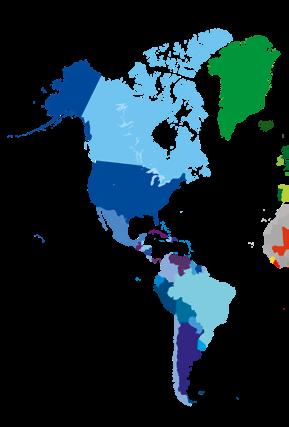
SOCIAL
Pre-school/kindergarten/sub primary 780 Primary schools 1,348
Secondary and high schools 508
and universities 17
training
471,519
47
19,075 Schools for blind students (included in above totals) 20
for disabled students (included in above totals) 39 Boarding schools (included in above totals) 161
36
centres 8

General hospitals 29
Capacity 2,150
Hospice long-term care 18
Capacity 620
Maternity hospitals 38
Capacity 892
Other specialist hospitals 38
Capacity 1,775
Specialist clinics 21
Capacity 3,398
General clinics/health centres 161
Mobile clinics/community health posts 1,201
Inpatients 467,509
Outpatients 747,981
Doctors/medics 11,208

Non medical staff 3,451
Invalid/convalescent homes 3
Capacity 156
Health education programmes (HIV/Aids, etc) 3,685
Beneficiaries 182,963
Day care programmes 58
Mobile units for service personnel 20
Chaplains 57
Community centres 476
Capacity 783,475
Day centres for the elderly 88
Capacity 3,403
Day centres for street children 6
Capacity 250
Day nurseries 371
Capacity 20,907
Drop-in centres for youth 256
Capacity 18,482
Other day care centres 1,090
Capacity 2,036
Prisoners visited 50,575
Prisoners helped on discharge 44,284
Police courts – people helped 51,730
Missing persons – applications 2,265
Number traced 813
Night patrol/anti-suicide – number helped 219,827
Employment bureaux – applications 61,440
Initial referrals 67,384
Counselling – people helped 204,534
General relief – people helped 16,939,895
Emergency relief (disasters) – people helped 10,152,114
Emergency mobile units 7,549
Feeding centres 42,154
Restaurants and cafés 145
Apartments for elderly 1,067
Capacity 4,687
Hostels for students, workers, etc 60
Capacity 1,141
Land settlements (capacity) 88

Social Services summer camps 47
Participants 5,796
Disaster rehabilitation schemes 83
Participants 241,407
Refugee programmes – host country 28
Participants 164,765
Refugee rehabilitation programmes 28
Participants 165,024
Other response programmes 146
Participants 4,013,710
 Foreword by General Brian Peddle
Foreword by General Brian Peddle

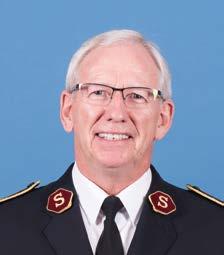
As I write this foreword to you, war has been raging in Eastern Europe for many months; in other parts of the world, there are protests resulting in violence and in some cases, loss of life; there are places where the government has been overturned by nationals fighting for what they believe is right; other parts of the world are experiencing disastrous heat, floods, mudslides and other natural disasters as the scientists report that the globe is warming; in some countries, political structures crumble at the hands of politicians who have been party to lies, cheating and a lack of integrity. There are many more instances that I could cite – but in each of these scenarios, ‘trust’ is eroding. Whether it is the trust between countries, or between people and their government, or just simply trust in a way of life that is no longer the same as it once was – it is a matter of trust.
You will read in this document, a great deal about a trust (‘SAIT’ – see page 8). But it draws attention to the need to be trusted. In a world where things seem to be falling apart, The Salvation Army seeks to be a trusted partner for people who are in need. The Salvation Army seeks to do that by demonstrating to the world our trust in God who is attentive to every individual, no matter what their need might be. But The Salvation Army also needs to be trusted with the hard things. The Salvation Army needs to have a framework within its structure that will provide accountability, monitor appropriate activity and keep the trust of those we serve, as well as those who support our mission.
I believe that as you read this report, you will find that level of accountability within the pages of this document. As I travel the world, I see amazing work being done in the name of Jesus, at the hands of many who are committed to the work and ministry of The Salvation Army. We can only provide you with a snapshot of this work but I believe you will quickly see that God is blessing our Salvation Army as we remain faithful to him and faithful to the trust for which we are responsible.
I must express my sincere thanks to the directors, bankers, solicitors, auditors and investment managers who work to ensure best practice, legislative compliance, fiscal responsibility and effective allocation of resources that are given to The Salvation Army in trust.

As you read through the stories of transformation, I hope that your trust in The Salvation Army will be reinforced, but even more, that your faith in God will be stronger knowing that he is doing a greater work in us than we could ever imagine.
God bless you!
Sincerely yours,
Brian Peddle GENERAL
As the Chair of the Board of Directors of The Salvation Army International Trustee Company (‘ SAITCo’ - see page 8), it is my privilege to commend the Annual Report to readers.
The Trust exists to further the work of The Salvation Army, which is to advance the Christian religion and meet human need as and where it occurs throughout the world. It also supports the work of International Headquarters, which is responsible for coordinating the international work as well as overseeing strategy.
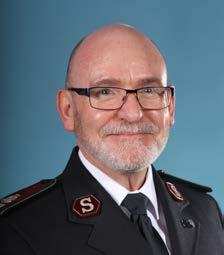
The work of The Salvation Army globally is vital and greatly valued. At a time of significant crisis and challenge in our world, I am proud of the way in which Salvation Army resources have continued to be managed to both enable and ensure the provision of high levels of service. This has been particularly evident in our on-going response to the global pandemic and the situation involving Ukraine and Russia.
In the midst of a challenging year, we have also taken on a number of reforms.
In response to the wide ranging and significant governance review in recent years, SAITCo has implemented a number of reforms this year including changes to the operation of subsidiary boards, committees and councils, an update of expenditure authority thresholds for financial decision-making and internal staff reorganisations. Alongside this, SAITCo has continued to embrace many governance activities outlined within the Charity Governance Code. In response to the most recent update of this code, further actions are being considered which focus on the principles of integrity and equality, diversity and inclusion as well as risk management protocols and the strategic planning process, all of which will strengthen our movement.
There is no denying COVID-19 has had its impact on the global movement. During the 2021/22 year as many territories started to move out of the grip of the pandemic and the restrictions this placed upon their ministries, new service opportunities have arisen, and adjustments have been made to better address their new realities.
SAITCo continues to monitor closely developments in relation to the COVID-19 crisis, the Russia/Ukraine crisis and other events. We are confident the Trust is well placed to continue to achieve its objectives due to a strong financial position and sound governance.

I express my sincere appreciation to fellow directors of SAITCo for their commitment, passion and professionalism.
The movement is well positioned to meet its mission objectives and continues to make a positive global impact.



Yours in his service,
Lyndon Buckingham CHIEF OF THE STAFFThe General, acting under powers contained in The Salvation Army Act 1980, established the Trust to further the worldwide work of The Salvation Army. The Salvation Army International Trustee Company (‘SAITCo’), a company limited by guarantee, was formed and appointed as the ordinary Trustee of the Trust. The directors of SAITCo are thus effectively the charity’s trustees.
THE SALVATION ARMY INTERNATIONAL TRUST Registered Charity No 1000566 Trust Settlement Deed dated 21 September 1990 (Governing Document)
THE SALVATION ARMY INTERNATIONAL TRUSTEE COMPANY – ORDINARY TRUSTEE Company Registration No 2538134
The trustee is pleased to present the Annual Report for The Salvation Army International Trust (the ‘Trust’) for the year ended 31 March 2022. 08 STRUCTURE, GOVERNANCE AND MANAGEMENT 64 STATEMENT OF FINANCIAL ACTIVITIES

The General of The Salvation Army, as founder of the Trust, specifies the qualifying offices and the experts for SAITCo. Qualifying offices are such offices of The Salvation Army as the General may from time to time specify by notice to SAITCo and experts are persons who satisfy such conditions and/or who have such qualifications or expertise as the General may from time to time specify by notice to SAITCo. Both the qualifying offices’ holders and the experts make application for membership of SAITCo with consent to become directors and are accepted by the Board of Directors of SAITCo.
All new directors follow teaching modules prepared specifically for The Salvation Army on its constitution, operational scope and the duties and responsibilities of directors. In addition individual directors follow external courses.
Commissioner Birgitte Brekke-Clifton SRN from 1 March 2013 to 30 June 2021
Commissioner Lyndon Buckingham from 3 August 2018
Commissioner Keith Conrad from 1 August 2019
Commissioner Lee Graves MBA from 1 November 2020
Commissioner Edward Hill MDiv, MACE from 1 May 2021
Commissioner Debbie Horwood from 1 July 2021
Commissioner Eva Kleman from 1 November 2020
Commissioner Robyn Maxwell from 1 November 2020
Commissioner Suresh Pawar from 12 November 2020
Commissioner Mark Tillsley BA, MSc, PhD from 11 May 2018 to 30 April 2021
Lieut-Colonel Russell Malcolm BCom, DipApTh, MBA,CAANZCA from 1 February 2022
Dr Matthew Carpenter BA, MBA, DBA, MCMI from 1 July 2014 to 31 January 2022
Ms Elizabeth Edwards BSc(Hons),FRICS from 1 May 2013 to 30 April 2022
Mr Robin Foale from 1 May 2019
Mr James Gardner MA from 1 May 2022
Mr Mark Goodale BA, FIA from 1 May 2019
Mr Peter King Solicitor, MA from 1 May 2013 to 30 April 2022
Mr Robert Lister from 1 January 2016
Mr Tim Sketchley BA,MA(Cantab),FRICS from 1 May 2022
Ms Rosie Bichard GCB.D, CFA (Chair)
Ms Elizabeth Edwards BSc(Hons),FRICS
Mr Mark Goodale BA, FIA
Mr Tim Sketchley BA,MA(Cantab),FRICS
Mr Andrew Stickland BA(Hons),FCA
Commissioner Lee Graves MBA Managing Director
Dr Matthew Carpenter BA, MBA, DBA, MCMI Company Secretary
Dr Matthew Carpenter BA, MBA, DBA, MCMI Head of Finance to 31 January 2022
Lieut-Colonel Russell Malcolm BCom, DipApTh, MBA,CAANZCA Head of Finance from 1 February 2022
Mr Kaloan Belito BA, DchA, MSc, FCCA Chief Accountant
HSBC Bank plc
60 Queen Victoria Street
London EC4N 4TR
Reliance Bank Limited
Faith House, 23-24 Lovat Lane
London EC3R 8EB
National Westminster Bank 38 Strand
London WC2N 5JB
Slaughter and May
1 Bunhill Row
London EC1Y 8YY
BDO LLP
55 Baker Street
London W1U 7EU
Sarasin & Partners LLP
Juxon House
100 St Paul’s Churchyard
London EC4M 8BU
The Trust exists to further the work of The Salvation Army and of its International Headquarters (IHQ), which is to advance the Christian religion and meet human need as and where it occurs throughout the world. The operation of IHQ is therefore an integral part of the work of the Trust. IHQ is responsible for coordinating the international work and overseeing strategy.
The Salvation Army is, for administrative purposes, divided into autonomous territories (generally by region or country). Each territory is governed, through local registration(s), in accordance with the applicable local laws and the Trust works with and through these separate legal entities. However, The Salvation Army remains under the oversight, direction and control of the General of The Salvation Army, as set out in greater detail in The Salvation Army Act 1980.
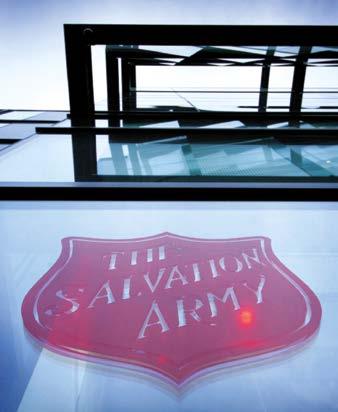
The Salvation Army Retired Officers Allowance Scheme

Registered Charity 1153681
Declaration of Trust dated 13 December 2012
The Salvation Army Retired Officers Allowance Scheme is a separately registered charity that is administered by SAITCo as the trustee.
The objects of The Salvation Army Retired Officers Allowance Scheme are to relieve the poverty of retired officers and the financial hardship amongst elderly retired officers of The Salvation Army anywhere in the world.
The work of The Salvation Army in the United Kingdom and the Republic of Ireland is directed by the United Kingdom Territory with the Republic of Ireland, with resources provided through trusts administered by The Salvation Army Trustee Company. The two principal trusts of this territory are The Salvation Army Trust and The Salvation Army Social Work Trust.
The banking company, Reliance Bank Limited (the ‘Bank’), is a wholly owned subsidiary of the Trust. In 2018, the Trust purchased The Salvation Army Trust’s (UK Territory) 49% interest in the Bank and invested an additional £1.5 million in the Bank’s share capital. Under its new ownership model
and through the delivery of its five-year strategic plan, the Bank aims to become an important, positive social impact bank. Between December 2019 and March 2022, £4 million of additional share capital was invested by the Trust in the Bank to support its strategic plan against the background of the global pandemic, ultra-low interest rates and the Bank’s investments in systems and resources.
The Bank offers transactional banking services to more than 30 Salvation Army territories, providing a vital ‘safe haven’ for project funds and IHQ operational grants and a secure platform for international fund transfers for the global Salvation Army. The Bank offers these territories a comprehensive product range including current accounts and fixed interest products in GBP, USD and EUR as a UK domiciled bank authorised by the Prudential Regulation Authority and regulated by the Financial Conduct Authority and the Prudential Regulation Authority.
Additionally, the Bank meets the functional banking requirements of IHQ (as distinct from territories) processing payments to a wide range of international locations, providing personal banking services for non-UK nationals working at IHQ, creating bespoke banking arrangements for territories to match specific IHQ requirements and obtaining bank ratings information to inform IHQ evaluation of proposed bankers for territories. The Bank also provides a wide range of banking services to The Salvation Army (UK and Ireland Territory) and offers employees of Salvation Army organisations personal lending and current account services at market rates. The Bank further provides banking services and lending secured on property to other UK charities and positive social impact organisations, as well as savings and mortgage products to the general public.
In 2018, SAITCo as ordinary Trustee of the Trust, undertook considerable due diligence before acquiring sole ownership of the Bank, with the Board of Directors receiving multiple reports from appointed consultants on legal, tax, accounting, governance, risk and regulatory considerations, including a detailed critical analysis of the Bank’s five-year strategic plan. During 2021/22, to support the investment of additional share capital, the Trust refreshed this diligence by engagement of an external consultant to review the Bank’s performance to the five-year strategic plan and advise SAITCo on other related matters. The consultant’s report highlighted a number of areas within the strategic plan for ongoing monitoring and assesment by SAITCo through established reporting mechanisms. From time to time, the Trust will again refresh this appraisal and critically evaluate the Bank’s performance against its strategic plan.
Ordinarily, the Bank will donate a proportion of its net taxable profits to support the mission of the Trust. This has not been the case during the last few years, as the Bank is investing in its structures and systems as it embarks on its new strategy under the sole ownership of the Trust. Historically, the Bank’s business model was to invest the funds it received from customers, with treasury counterparties, and the margin received more than covered the fixed costs of running the Bank. As interest rates fell, this model became unsustainable. The new five-year strategic plan aims to build a social impact lending portfolio, not only to improve financial returns, but to align to the mission of supporting communities.
Consolidated accounts for the Trust incorporating the Bank as its banking subsidiary are presented for 2021/22 as well as charity results, assets and liabilities for the Trust (see page 64).
Whilst the Trust is the Bank’s parent controlling entity, a Nominations Committee comprising Non-Executive Directors of the Bank recommends the appointment of Directors to its board. This includes consideration of proposed shareholder-representative Directors.
The Bank, in common with all banks, faces several inherent risks such as credit risk, interest rate risk, risk arising from holding foreign currencies, climate change risk, compliance risk, conduct risk and operational risk. Policies are in place to ensure that the Bank’s exposure to these risks is monitored and controlled. The Bank maintains a risk register which is regularly reviewed by its Board Conduct, Risk and Compliance Committee and Executive Committee.
The Salvation Army Leaders’ Training College of Africa and Resource Centre Limited
The Salvation Army Leaders’ Training College of Africa and Resource Centre Limited is a wholly owned subsidiary of the Trust.
During 2020/21 a restructuring was progressed for SALT College, a training facility in Nairobi, Kenya, for Salvation Army territories in Africa that hitherto operated as an integral part of the Trust. This was registered in Kenya as a separate legal entity controlled by SAITCo to which the Trust transferred assets and so, from 1 August 2020 and during the year under review (2021/22), is no longer reported within the charity only accounts of the Trust but within the Group accounts. The assets transferred from the Trust to the separate legal entity in 2020 in the sum of £26,309 are not material to the Trust.
The Trust utilises a committee structure to supervise its operations. SAITCo’s Board of Directors, including five Independent Non-Executive Directors, delegates day-to-day financial management decisions to the International Finance Board (‘IFB’), International Business Board and International Projects Board within clearly defined parameters. The terms of reference for subsidiary boards and the minutes of all meetings of these boards are reviewed by the Directors on a regular basis with a review of terms of reference undertaken in September 2021 and November 2022.
SAITCo has a Serious Incident Reporting Policy and Procedure in place, last reviewed in July 2022, outlining the process to be followed to decide if an incident relating to the Trust would be appropriate to be reported to the Charity Commission as a serious incident in accordance with the latest regulatory guidance.
A well-established Internal Audit Department also carries out a cycle of reviews of the systems in operation within IHQ and in all countries where The Salvation Army is working and a framework of internal controls and local financial management systems are in place, supported by a manual of International Financial and Accounting Standards (‘IFAS’) for The Salvation Army issued from IHQ. Salvation Army territories also share findings of locally instructed external audits of territorial operations with IHQ for review and consideration within the internal audit process. A project is well advanced to roll out cloud-based accounting software to all financially supported territories by 2025/26 to enable more regular and more detailed reporting both within territories and from territories to IHQ. A new reporting mechanism from all territories to the IFB commenced during 2020/21 and remains in place, based upon the suite of 17 Key Financial Indicators (‘KFIs’) defined within the IFAS manual, allowing IHQ to be better informed of the financial position in territories as a significant enhancement to internal controls.
An Audit Committee also meets on a quarterly basis and comprises five members, including two Independent Non-
Executive Directors of SAITCo, with none of the members holding executive responsibility for management of the Trust. The Committee holds delegated responsibility on behalf of SAITCo for continual review of the financial management and internal controls of the Trust and holds a direct line of communication to the internal and external auditor.
SAITCo has undertaken a wide ranging and significant governance review in recent years assisted by an external consultant and involving a review of SAITCo membership, structure, interrelationships with other IHQ bodies, performance and effectiveness as well as benchmarking to good governance practice as outlined within the Charity Governance Code. SAITCo already embraces many governance activities outlined within the Code such as conducting board induction and training, managing potential or actual conflicts of interest and regularly reviewing terms of reference for subsidiary boards with opportunity for further development in areas such as formal monitoring of Board skills and performance. Further actions are also being considered within the ongoing governance review process following the most recent update to the Code which focuses on the principles of integrity and equality, diversity and inclusion.
A Board Charter for SAITCo was developed during 2019/20 within the governance review process and approved for implementation. The Charter defines the roles, responsibilities and authorities of SAITCo in the effective and efficient functioning of the Trust and considers mission objectives, board roles, board procedures, board composition, board committees, board induction and ongoing training, conflicts of interest and board evaluation.
During 2020/21, the Articles of Association of SAITCo were revised and the SAITCo Board Charter further reviewed and updated to embed reforms prompted by the governance review. An operational review of IHQ was also undertaken during 2020/21 with assistance from two consultants and a remit to examine staffing establishments, explore effectiveness of internal communication and review the internal committee structure including the purpose, membership, expectations, outputs, reporting lines, accountability and decision-making thresholds of each board, committee and council. A number of reforms highlighted by the operational review were implemented during 2021/22 including changes to the operation of subsidiary boards, committees and councils, update of expenditure authority thresholds for financial decisionmaking and internal staffing reorganisations.
A further body of agreed actions is anticipated in 2022/23, prompted by the governance review, with a particular focus on reforms to risk management protocols and the strategic planning process as well as additional items highlighted by the Charity Governance Code.

The Salvation Army International
SAITCo has in place a number of dedicated governance arrangements in respect of its role as sole owner of Reliance Bank Limited, having taken advice on this from an external consultant as part of the body of due diligence work undertaken towards acquiring sole ownership of the Bank. An additional Director with banking expertise was successfully recruited to the SAITCo Board in May 2019 and remains in post with two shareholder representatives appointed to the Bank board and mechanisms in place for performance reporting for the Bank to SAITCo and risk management for the Bank to the Risk Management Committee of the Trust.
SAITCo is committed to ensuring a proper balance between paying staff to attract and retain the best people for the job, and careful management of charitable funds.
Management remuneration policies and practices within the Trust are reviewed periodically by SAITCo with day-to-day decisions delegated to the Employee Review Board and Job Grading Panel within clearly defined parameters. The IHQ Remuneration Policy was last reviewed and updated by SAITCo in January 2021 with a further update scheduled for January 2023.
There are two grading structures currently used at IHQ – an IT specialist scale and a main pay scale for all other employees. The differentiation is to address the market salary demands of IT specialists in the third sector. Posts are graded between eight evenly distributed grades, each of which contain nine main spine points (three per cent apart) and two upper spine points (six per cent apart). The scales were formulated, and are subject to ongoing review, with assistance from an external consultant to undertake market comparisons and objective benchmarking to comparable roles in other organisations.
New staff are usually appointed at the lower spine points of the grades, though this can differ for some specialist posts or due to candidate experience. Postholders may progress through the pay grade subject to completion of performance appraisals with a ‘highly effective’ or ‘exceptional’ performance rating. Cost of living increases are also awarded periodically to all staff by SAITCo, with an assessment made within the annual budget setting process to determine any proposed inflationary adjustment with reference to the Consumer Price Index and the financial position of the Trust.
Further remuneration disclosures for the Trust and group for this reporting period are shown within Note 15 to the Accounts. The Trust did not have any UK volunteers, excluding trustees, during the reporting period.
The Salvation Army is very active in bringing practical assistance to those whose lives have been affected by the evil of modern slavery and as such is sensitive to the danger of inadvertently finding itself falling short of its own beliefs and standards in this regard as well as the standards set out in the UK Government’s Modern Slavery Act 2015. The Modern Slavery Act 2015 compliance statement for SAITCo, last reviewed and updated in November 2022, can be accessed at http://www.salvationarmy.org/ihq/ modernslaveryact2015 and provides details of the variety of measures undertaken by SAITCo to avoid and reduce the risk of inadvertently supporting modern slavery in any way.
Section 162a of the Charities Act 2011 requires charities to make a statement regarding fundraising activities. Although the Trust does not actively undertake widespread fundraising from the general public, the legislation defines fundraising as ‘soliciting or otherwise procuring money or other property for charitable purposes’. Such amounts receivable are presented in the Accounts as ‘Other Donations and Legacies’.
In relation to the above SAITCo confirms that no fundraising activity has been taken by the Trust, or by anyone acting on its behalf, that no fundraising standards or scheme for fundraising regulation have been subscribed to by the Trust, or by anyone acting on its behalf, that no complaints in relation to fundraising activities have been received and that any solicitations are managed internally, without involvement of commercial participators or professional fundraisers.

The Trust is operating for the public benefit and in keeping with the organisation’s mission statement. In setting and reviewing the Trust’s aims and objectives and planning future activities, the Trustee pays due regard to the guidance issued by the Charity Commission on public benefit. The main activities of the Trust are:
● To continue the advancement of the Christian religion through evangelistic outreach
● To continue to provide financial assistance to The Salvation Army where needed
● To provide effective leadership and share knowledge and expertise through the strategic deployment of personnel
● To respond to and help meet the needs arising from major crises
● To strengthen The Salvation Army’s capacity to support poor and marginalised people who need access to quality primary health care services as close to the family as possible
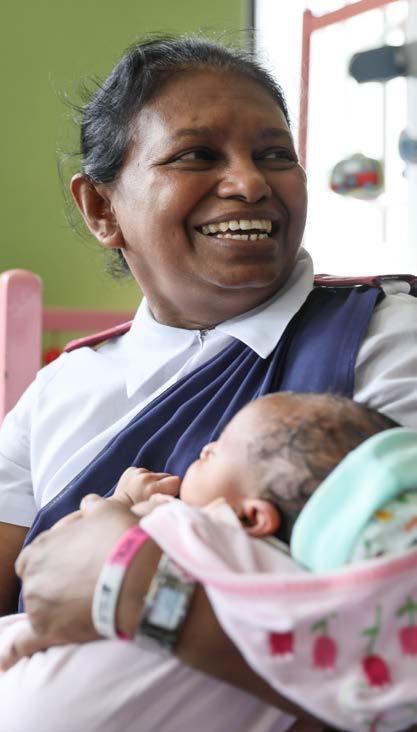
● To take action to combat the massive and growing evil of sexual trafficking and to create awareness of social injustice in the world.
A breakdown of expenditure per these main charitable activities of the Trust is presented at Note 10 in the Accounts. This shows a significant outlay on funding assistance to Salvation Army territories (under the second activity listed above) recognising that such grants also aid fulfilment of the other stated objectives as Salvation Army territories provide a wide range of local church/social programmes having received the IHQ funding necessary to maintain day-to-day operations.
Specific aims for each of the main activities of the Trust during the reporting period are outlined in the sections below. The activities of the charity are rendered without discrimination and for the benefit of all people in need.
The activities of the charity are rendered without discrimination and for the benefit of all people in need
“

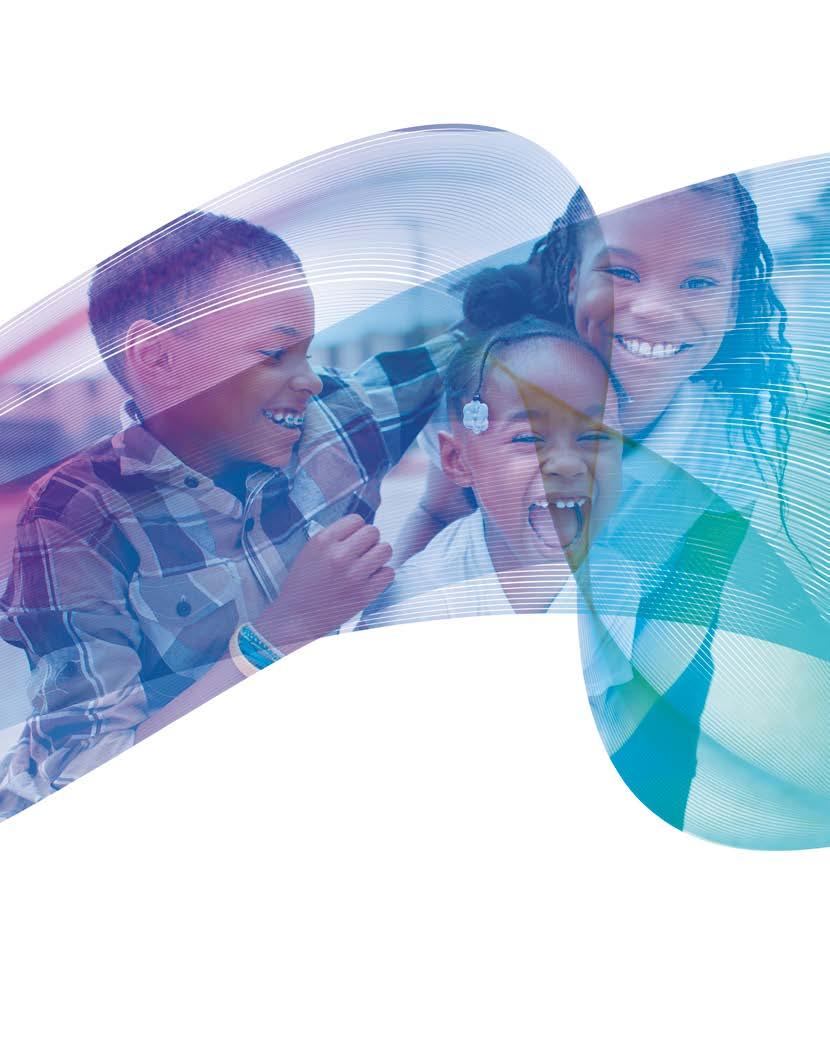
To continue the advancement of the Christian religion through evangelistic outreach.

World Mission objectives are to encourage and enable people linked to The Salvation Army to reach out into their communities with spiritual and practical support, to offer online and other resources to Salvationists and friends around the world and so create a supportive network through which people can share in prayer and evangelism, and for the General and the Chief of the Staff to visit Salvationists and friends around the world, providing opportunities for increased publicity and offering encouragement and challenge.
Although the COVID-19 crisis continued to impact travel and gatherings, international leaders offered encouragement and support to Salvationists and friends around the world through weekly devotional videos and virtual visits with
(World President of Women’s Ministries) continued to support and encourage Salvationists around the world through virtual visits – with some in-person international visits also able to take place for the first time in many months to Liberia and Sierra Leone Command, Latin America North Territory and USA Southern Territory.
Virtual visits included congresses in USA Central, France and Belgium, Pakistan and Denmark and Greenland territories and the Easter Sunday holiness meeting in Bangladesh Command.

In November 2021, the international leaders participated in an ecumenical service at Glasgow Cathedral, United Kingdom, in a show of ecumenical solidarity for global climate justice, in conjunction with COP26, the United Nations (UN) Climate Change Conference.
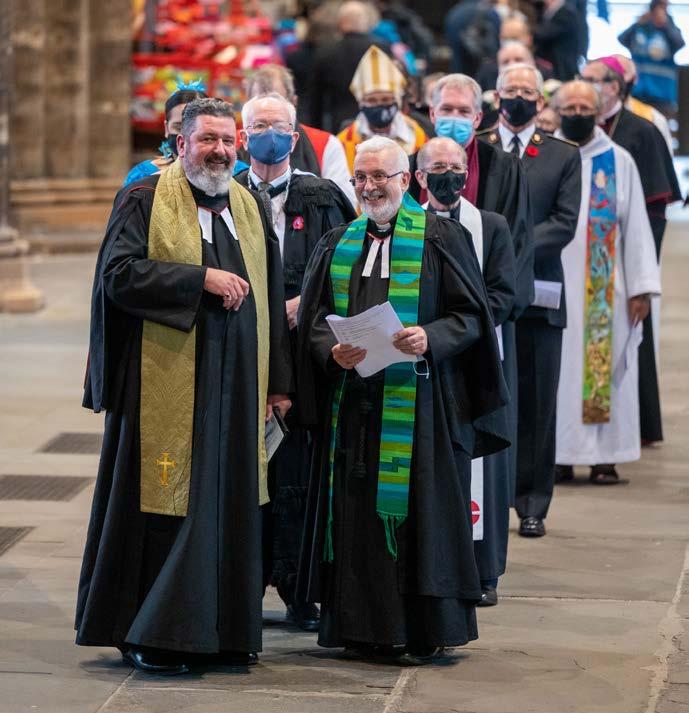
The General continued to use his social media platforms to connect with Salvationists through weekly devotional videos. In his New Year message, he challenged Salvationists to do something new. He urged: ‘Find a need in your community or in the wider world and ask: “How can I make a difference?”’

For Easter 2021, the IHQ Communications section created the Great Easter Trail initiative and resources to ensure the hope and life-giving power of the Easter message could still be shared even in lockdown conditions.
Later in the year saw the live-streamed global launch of the publications Called to be a Soldier: Exploring the Soldier’s Covenant and Day by Day: Call to Mission, the second global wave of prayer for those affected by the COVID-19 pandemic and campaigns influenced by the UN International Day of the Girl and International Women’s Day 2022.
General Peddle speaks at the live-streamed global launch of the publications ‘Called to be a Soldier: Exploring the Soldier’s Covenant’ and ‘Day by Day: Call to Mission’

The team continued to support the production of the General’s weekly devotional films as well as creating social media posts in support of other IHQ sections including Women’s Ministries and Spiritual Life Development. A cohesive brand and colour palette for IHQ social media visuals was also developed.

Gallery 101, the exhibition space at IHQ in London, UK, was also used to share and communicate messages and values during the year. Events opened with a thoughtful exhibition about the International Holocaust Remembrance Day, followed by a book launch and exhibition for Walking with Communities and an integrated campaign for World Water Day. The latter included the distribution of free reusable water bottles which carried a QR code directing the user to information about the exhibition. Gallery 101 is designed to bring people into the IHQ café space and inform them about the international work of The Salvation Army.
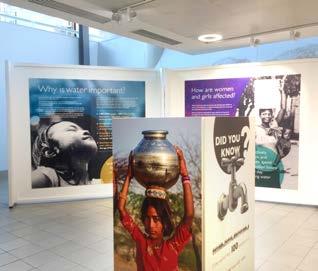

The IHQ Youth and Children team also invested in building relationships during the year, sharing and updating resources, growing its social media presence and creating platforms for young people to speak into the fabric of The Salvation Army.
Captains Marc and Mariska Potters, the International Youth and Children’s Officers, started online conversations with all territorial and command youth leaders, providing opportunities for them to share their hopes and fears with IHQ, but also to ask questions and share how IHQ could support their ministry.
Salvation Books, the publishing imprint of The Salvation Army, produced several notable publications during the year. In July 2021, Called to be a Soldier and Day by Day were launched globally with the stated aim of making a copy of both books available to every senior soldier around the world.
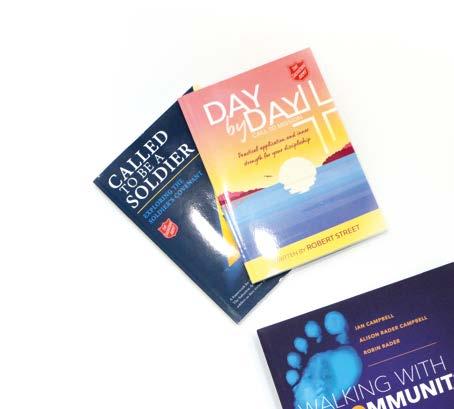
Called to be a Soldier focuses on each of the ‘I will...’ statements of intention from the Soldier’s Covenant, outlining the possibilities and opportunities of life as a Salvation Army soldier. Published as a companion, Day by Day by Commissioner Robert Street considers what following Jesus looks like in today’s reality. Both books are available in more than 50 languages and dialects, ensuring as many soldiers as possible can journey together in exploring the implications of soldiership.
Another published title, Walking with Communities by Ian Campbell, Alison Rader Campbell and Robin Rader is a global and local journey of integrated mission in stories and images which demonstrates the resilience and the amazing capacity of local communities to deal with crisis and conflict when appropriately accompanied. It affirms the significance of Salvationists engaging with their local neighbourhoods and illustrates how local change can have global impact.

Words of Life is a daily devotional book published three times a year, offering bite-sized Bible readings and reflections that provoke thought and deepen understanding, written by officers from around the Army world.

Accurate translation is essential if The Salvation Army is to communicate its mission and message clearly and concisely to a global, linguistically and culturally diverse audience. Translation also allows for increased participation and involvement of members, staff and volunteers.
The IHQ Translations desk oversaw many large-scale translation projects during the year. A COVID-19 poster to promote vaccine take-up and to encourage social distancing, mask-wearing and good hygiene practices was translated into more than 25 languages. The two books, Called to be a Soldier and Day by Day were translated into more than 50 languages, which is The Salvation Army’s largest translation project to date and will facilitate the goal of making the book accessible to more than one million Salvationists.
The International Literature Programme (ILP) provides funding to ensure Salvation Army literature is available to financially supported territories in the language of the local people. Recent projects funded by ILP include: the Bambara translation and printing of Orders and Regulations in the Mali Region; the printing of the Easter War Cry in the Caribbean Territory; the translation of Army on its Knees, Head, Hands and Feet and Servants Together into Portuguese in the Spain and Portugal Command; and the translation of the international Women’s Ministries Bible studies series in Pakistan Territory.
● The main IHQ Salvation Army social media accounts received the following impressions in the 2021 calendar year: Facebook: 586,707; Instagram: 20,904; and for Twitter in the last quarter of 2021: 125,800.

● The publications Called to be a Soldier and Day by Day have been translated into more than 50 languages and continue to be translated into further languages and dialects.
● The international leaders engaged in 19 virtual and inperson visits during the year.

The General will continue to travel around the world engaging with Salvationists, friends, supporters and people of influence, undertaking in-person visits where possible and virtual visits when international travel is limited due to COVID-19 or other restrictions. The General and Chief of the Staff, having engaged directly with all territorial leaders at an International Conference of Leaders in Vancouver, Canada in September/October 2022, will continue significant dialogue on how The Salvation Army can best meet its mission in the 21st century with a concentrated focus on key themes of the conference ‘Our Identity, Our People and Our Priorities’.
International Headquarters will continue to resource Salvationists around the world through development of books and magazines with translation of resources to make content available to as many people as possible.

The need for increased production of digital media and video content is recognised and IHQ has recently recruited a new Production Manager with plans in place to significant enhance video offerings over the coming year.
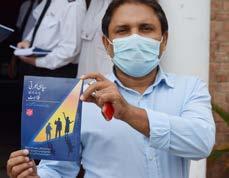

To continue to provide financial assistance to The Salvation Army where needed.
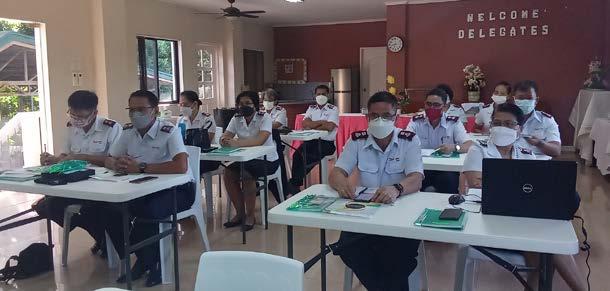
b. International Property Project, overseen by a fulltime consultant based at IHQ, aims to assist territories in highest and best use reviews of underutilised property assets as a step towards financial independence. During 2021/22, despite continuing challenges in the global environment, the project aimed to work with territories to continue progression of existing property projects in Kenya and India and to explore potential new opportunities working with global property consultants to develop potential schemes through a number of recognised stages.
The Trust seeks to provide financial assistance, infrastructure and technical support to territories through a wide range of programmes including grant funding and delivery of largescale international projects with a particular focus upon four areas of work during 2021/22:

a. International Development Services (IDS), based at IHQ, aims to engage, equip, and empower local communities for effective development globally. This year, as many territories started to move out of the grip of the COVID-19 pandemic, it was increasingly necessary for IDS and partner territories to work closely together, seeking the best way to recommence development projects placed on hold during earlier lockdowns and restrictions. IDS aimed to facilitate necessary changes to project proposals and allow alterations to existing projects to better address new realities in territories. In addition, IDS planned to strengthen The Salvation Army’s transformative impact in engagement with surrounding communities with specific objectives for the IDS team around skills development, partnerships, strengthening organisational capacity and working with development principles.
c. International Financial and Accounting Standards (IFAS) involves a global project team led from IHQ implementing cloud-based NetSuite accounting software to all financially supported territories alongside the roll out of new International Financial and Accounting Standards for the global Army. The software deployment replaces basic standalone systems, assists territories in complying with IFAS reporting and enables implementation of computerised internal financial controls to replace time-consuming manual processes. This year, key objectives were to continue the roll out of the software to a further group of territories, develop enhanced solutions for budgeting/reporting and point of sale and to construct e-learning resources.
d. Office 365 Project involves a large project team at IHQ and within territories rolling out a global collaboration and communication solution to provide an official Salvation Army digital identity for every officer and employee who uses technology to achieve mission tasks for The Salvation Army. Specific objectives during the year were to progress migration from a locally and internationally used legacy database system to alternative in-house or externally hosted platforms and to define the scope and approach to the next stage of the project to initiate and complete required programmes.
The IDS team have worked with territories to encourage sustainable, long-term positive change in communities, continuing to strengthen relationships with territorial project staff through online calls and provision of technical/financial support, while also progressing development of the Learning Pathways programme.

Learning Pathways is a skills-based training programme in community development, engagement and project management designed for use by territorial staff and volunteers. It is currently available in nine different languages with more translations being developed. Through the identification and pursuit of personal learning goals and application of action-reflection learning, students are challenged to enact positive changes in their personal life and communities. Student feedback since the launch of the pilot programme in 2017 includes the following comments: ‘the course brings together several ideas and concepts that are important to the Salvation Army mission and message and integrates them in a meaningful way’ and ‘the most effective part of the course is the practical application and reflection questions. I found the readings inspiring and interesting and enjoyed the practical aspect, theory into action’. Since Learning Pathways was formally launched in June 2021 more than 75 delegates from 39 Salvation Army territories have participated. Currently, 42 territories have appointed Learning Pathways Coordinators and 22 learning groups have been formed of participating students.
The IDS team have also sought to better link relief, rehabilitation and development during 2021/22, working on a project to ensure a joined-up approach between delivery of emergency services and the formulation of development projects. IDS facilitated activation of 536 mission support projects in the 2021 calendar year and 251 community development projects during 2021/22 that were funded either by the Trust or financially independent Salvation Army territories.
AFRICA: IDS facilitated the activation of 74 community and institutional projects for work across Africa in 2021/22. These range from a literacy project in Mali which expanded to meet demand from neighbouring communities, to support for a school for children with disabilities in Tanzania which received letters of congratulations from the national government for their excellent results, and to a water and sanitation project in Zambia which provided safe water supplies to five communities and improved the sanitation and hygiene status in schools and health centres. In such projects African territories are striving to widen their impact beyond the immediate project through work with national governments and institutions. One excellent example of this is in Kenya where during the year the Kenya East Territory concluded a community-based anti-human trafficking project in which 62 Rights of Child groups were established and 19 community-based groups were formed. Due to The Salvation Army’s strong and influential work in this sector the Kenya East Territory was selected as a member of the steering committee helping the national government to draft a Plan of Action on Anti-Human Trafficking.
RIGHT: Gaining essential life skills: literacy teaching in Kassela, Mali
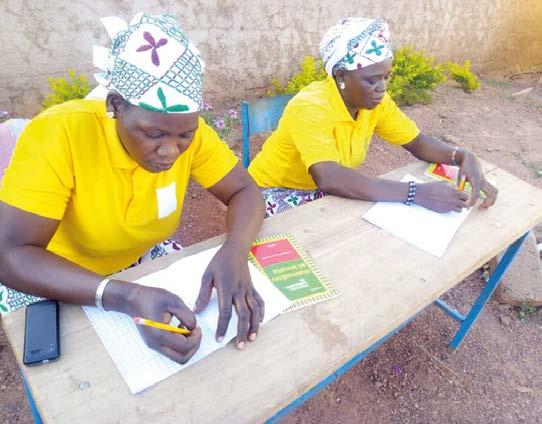
BELOW: Project funding in action: a new vehicle enables community visitation in Brazil
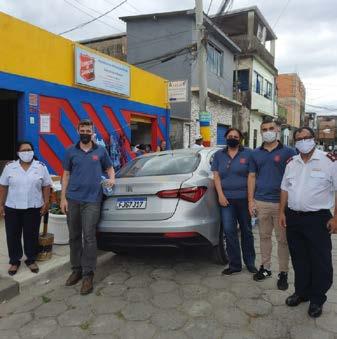
ASIA: Across the continent, 2021/22 saw great challenges related to the COVID-19 pandemic, but alongside this a gradual and determined return to programmed activities to help the most marginalised. During 2021/22, IDS facilitated the activation of 90 community and institutional projects among territories in South Asia and 40 in South Pacific and East Asia. Schools and children’s homes reopened, and children returned to in-person studies after long periods of online education. Where social work institutions remained closed, project work moved into communities and outreach programmes focused on increasing hygiene awareness and ensuring access to safe drinking water. In India, The Salvation Army started a water, sanitation and hygiene (‘WASH’) programme in 17 villages suffering from drought to provide almost 6,000 people with water wells. In Pakistan, support to the transgender community was initiated as this group had been excluded from some local pandemic response and was therefore increasingly vulnerable. Time was also devoted to development of an active anti-human trafficking community of practice for the region.
AMERICAS AND CARIBBEAN: Territories in the Americas and Caribbean continued to implement a range of community projects including youth and children’s clubs which often serve marginalised and vulnerable children and their families. IDS facilitated the activation of 33 community and institutional projects in the region during 2021/22. In Nicaragua, The Salvation Army continued to help address the results of the socio-political crisis in the country following years of attacks and violence with specialists in mental health offering psychological workshops, spiritual support and artistic activities with the aim of supporting children to
overcome the resulting trauma. Local Salvationists recognise the importance of children for the future of their country and so are acting to improve their emotional health and quality of life.
Overseen by a full-time consultant based at IHQ, the International Property Project works with globally recognised property firms to develop potential schemes for territories through the stages of scoping and identification, feasibility approval, detailed feasibility and implementation.
Despite continuing challenges in the global environment in 2021/22 due to COVID-19 and other factors, work continued with territories to continue progression of existing projects and explore potential new opportunities, illustrated by the following examples:
KENYA EAST: Construction continued on the building of 26 accommodation units for territorial headquarters (THQ) officers on unutilised land at the THQ site. The original plans were revised during the year to provide an additional accommodation block to better serve the new territorial structure following a governance review. The change extended completion of the work by four months into 2022. Following construction, existing accommodation units on another site will no longer be required, allowing this site to be redeveloped as a future phase of the project for income generating purposes and to incorporate a purpose-built facility for Fairtrade activities. A detailed feasibility study for this next phase of the project has been completed to determine the most appropriate plan for the site with an expectation that the new income generating activities will allow the territory to raise additional ongoing funds as an important step towards self-support.



The IFAS project involves a global project team led from IHQ implementing cloud-based accounting software (NetSuite) for all financially supported territories alongside the roll out of new International Financial and Accounting Standards for the global Army. The scale of this international project covering 41 financially supported territories is significant and unprecedented within the global Salvation Army.
Despite ongoing operational challenges resulting from the COVID-19 crisis, the IFAS project made significant progress during the year successfully implementing NetSuite in the following territories, commands and regions: South America West, Nigeria, Sri Lanka, Southern Africa, Taiwan, Papua New Guinea and Solomon Islands as well as at IHQ.
The IDS team have worked with territories to encourage sustainable, long-term positive change in communities
The project is well placed to continue the momentum gained, with close to a full complement of project staff, 40 local project champions trained and in place within territories, 13 territories already live on the system at year end and a further group of territories being prepared for deployment during 2022/23.
The following chart illustrates the project status as at 31 March 2022:
The IFAS Project Team have tailored the design and testing of the accounting software to meet Salvation Army requirements, adding inter-unit/consolidation tools, a Point
Number of NetSuite Users Trained
of Territories Implemented in 2021/2022
of Sale (POS) solution for territories with trading operations and new reporting tools allowing automatic generation of the Key Financial Indicators (KFIs) required for IFAS reporting.
The Point of Sale solution (Zoku) was successfully deployed to Zambia Territory during 2021/22 with other territories

planned to come online soon. A budgeting and reporting solution (PBCS) is currently in its final testing phase and due to be deployed in 2022/23. During the year, the IFAS Project Team also commenced work to design and deploy an e-learning solution with pilots run with 30 users on newly formulated IFAS e-learning courses. The IFAS Project Team also ran 10 monthly webinars to educate, inform and engage local project Champions in territories.
Territorial staff in Nigeria with IFAS project staff following training for NetSuite software go live


The Office 365 Project involves a large project team based at IHQ and within territories rolling out a new global collaboration and official Salvation Army digital identity for every officer and communications solution to provide an employee who uses technology to achieve mission tasks for The Salvation Army.
During the year, 75 per cent of IHQ provided databases were successfully migrated away from the legacy database system to alternative in-house or externally provided hosted platforms. A new and expanded service support model was successfully piloted in the following territories and commands: Zambia, Ghana, Italy and Greece, Kenya West, Sri Lanka with local IT Administrators trained to log support tickets and locally administer user accounts.
The Office 365 Project Team facilitated the purchase and shipping of laptops and other devices to territories with
398 devices shipped or awaiting delivery during 2021/22 covering 27 territories. Significant progress was also made in identifying and defining the key components of the next stage of the Office 365 programme, as well as the overall scope and approach to be taken. In particular, options and costs were identified to provide enhanced internet connectivity to all financially supported territories as well as to introduce a new lower cost and localised model for the provision of devices.
Significant progress was also made during the year in strengthening the IHQ IT team and building new capabilities in the wider Microsoft 365 product set. This enabled IHQ IT to provide a greater level of support to territories as well as to the Office 365 Project. A preferred global supplier for the procurement of hardware to financially supported territories is in place as well as a Global Enterprise Agreement with Microsoft.
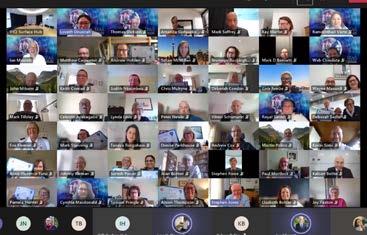

Over the next year, IDS will continue to strengthen The Salvation Army’s transformative impact in engagement with surrounding communities
● IDS facilitated activation of 536 mission support projects in the 2021 calendar year and 251 community development projects during 2021/22 that were funded either by the Trust or financially independent Salvation Army territories.
● The International Property Project Team assisted territories in assessment and development of property schemes for under-utilised assets in India, Kenya, Democratic Republic of Congo and Bangladesh during 2021/22.
● The International Financial and Accounting Standards Project Team facilitated implementation of new cloudbased accounting software in six territories and IHQ during 2021/22 with 13 territories live on the system at year end.
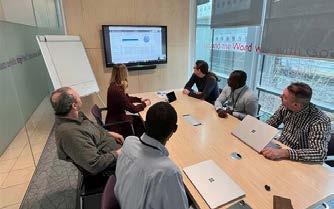
● The Office 365 Project facilitated the purchase and shipping of 398 devices to territories during 2021/22 covering 27 territories.
Over the next year, IDS will continue to strengthen The Salvation Army’s transformative impact in engagement with surrounding communities with a particular focus for the IDS team around skills development, partnerships, strengthening organisational capacity and working with development principles. IDS will also continue to develop and roll out the Learning Pathways programme to complement existing officer training programmes. Higher level studies will also be explored and devised with the help of internal and external course developers seeking to increase the capacity of Salvationists, officers, employees and volunteers worldwide in community engagement, development and project management. Continuing project support will also be offered to territories as required due to the ongoing effects of the COVID crisis and other global events.
LEFT TO RIGHT: Window to the world: IHQ staff testing new Teams Room equipment at International Headquarters
Welcome delivery: receipt of new IT equipment for South America West Territorial Headquarters, Chile

The International Property Project team will continue to support capital projects in territories and provide due diligence on property related proposals globally with particular emphasis on schools, children’s homes and territorial headquarters development projects. Feasibility work is anticipated for India, Kenya, Bangladesh and Democratic Republic of Congo. A number of seminars are also planned for 2022/23 to assist territories in property assessments and business planning.
The IFAS Project Team will work towards installation of the new accounting software in the remaining 28 territories, with a significant focus for 2022/23 deployments on intended roll out of NetSuite to all seven Indian territories and successful completion of all the software implementations targeted to 2025/26. Work will also continue to roll out the new Point of Sale (Zoku) solution and Budgeting/Reporting solution (PBCS) to territories. Another major objective is finalisation of the new e-learning materials with these to be formally launched to the global Army during 2022/23. It is also intended to hold an IFAS Champions Conference in 2022/23 to onboard local project Champions for the remaining group of territories to receive the NetSuite software. Finally, it is intended to refresh the International Financial and Accounting Standards manual, released in 2017, during 2022/23 through a consultative drafting process with significant consultation and involvement of territories.
During 2022/23, the Office 365 Project will move into a new stage encompassing scaling up of its roll out as well as the implementation of additional Microsoft 365 technologies which will enable enhanced collaboration and communications across the Salvation Army world. The programme will span multiple years and is likely to run until the end of 2024/25. For IHQ and financially supported territories, the next stage will also include the procurement and implementation of a new centrally managed network as well as the continuing roll out of devices. The final batch of IHQ provided databases will also be migrated away from the legacy database system during the year to alternative in-house or externally provided hosted platforms.

To provide effective leadership and share knowledge and expertise through the strategic deployment of personnel.
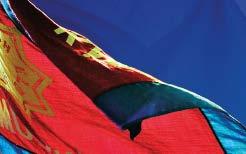

International personnel training and development objectives for 2021/22 included supporting training colleges around the world as they train officer cadets for culturally relevant ministry, compilation of a new Divisional Leaders’ Development Programme, review and clarification of territorial capability frameworks and continued delivery of an inclusive leadership course with online learning modules. Further objectives were to continue work towards a global resource repository for training and leader development needs, delivery of orientation training for new leadership in territories and restarting the residential training sessions of the International College for Officers (ICO) following disruption arising from the COVID-19 crisis.
for leaders within The Salvation Army. The year in review saw the first refresh of membership, with some founder members rotating off the council and being replaced by other representatives from different territories bringing fresh perspectives.
The International Officer Training and Leader Development Council (IOTALDC) met several times during the year, with membership drawn from across the global Salvation Army, to review and develop key areas of training and development
The council this year focused on the compilation of a new Divisional Leaders’ Development Programme with other projects including review of a Capability Development Framework for Salvation Army officers and review of the now published Orders and Regulations for Officer Training and Leader Development making language adjustments and areas of clarification in some curriculum headings. Other work of IOTALDC included initial planning and preparation for a proposed Training Principals’ Conference and further development of an International Resource Repository for use by officer training colleges and programmes with a working group researching needs and options for formation of the online resources needed for this project. Other key developments during the year were as follows:
SENIOR LEADERS’ ORIENTATION: When personnel are appointed to senior leadership roles in territories, they participate in an orientation conference hosted by IHQ and the first of a new-style one-week residential conference was held in March 2022. An online element of the programme continued, introducing new leaders to important aspects of their role within the first three months of their appointment. The plan for the future is that one residential conference will be held each year at Sunbury Court, London, including as delegates those who have previously participated in an online conference. Beyond the orientation, ongoing support and engagement is offered to new leaders, including mentoring/coaching for new leaders from current and recently retired leaders around the world.
OFFICER CADET TRAINING: As with many aspects of The Salvation Army, the training of future officers has been severely affected by the COVID-19 pandemic in recent years. Training colleges sought to continue training, despite the restrictions in education and residential activities and it was encouraging to learn of the many innovative solutions, mainly through technology, that were utilised to continue a high standard of training in many parts of the world. As the impact of the pandemic lessened, the International Personnel team at IHQ worked in 2021/22 to garner details of the approaches followed and new lessons learned so these can be disseminated and shared on a wider scale to inform future development of training processes.
INTERNATIONAL


Based at Sunbury Court, London, the ICO brings together groups of officers from around the Salvation Army world for a six-week training experience that considers the challenges and opportunities facing Salvation Army leaders in the 21st century. The ICO was unable to offer residential training in 2020 and much of 2021 due to the COVID-19 pandemic however early in 2022 onsite training returned with a session of 21 delegates. It was especially pleasing for ICO staff to welcome delegates and deliver a newly refreshed curriculum with new lecturers from a variety of areas of ministry including online presentations from lecturers from around the world. Many lessons were learned from this first experience since the lifting of COVID-19 restrictions with enhancements planned for future sessions. The delegate evaluations proved very helpful to ICO staff, confirming plans and ideas for future developments, with larger numbers of delegates to be included in future training sessions.
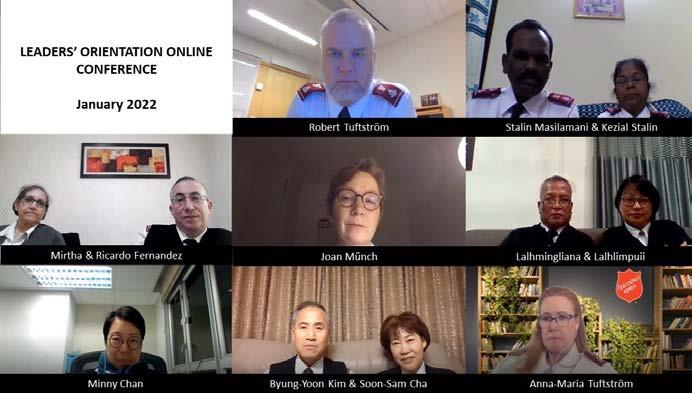
As a new innovation, a two-week Strategic Leadership Investment Initiative conference was held in November 2021 which enabled 46 officers from 21 different territories to gather at Sunbury Court, London, for intensive leadership development training. Many of the lectures were taken from the newly refreshed ICO curriculum which gave staff a good opportunity to review the effectiveness of materials. The feedback from delegates was exceptionally good and it was clearly a beneficial event for delegates and staff alike. It is hoped that future events such as this may be possible alongside the standard ICO sessions.
INCLUSIVE LEADERSHIP COURSE: A new online course was introduced in 2019/20 for the development of officers in preparation for potential leadership roles, with course content further refined and developed during 2021/22. A focus for the year was on providing discussion and reflection material for learning communities to use as they gather to reflect on what they have learned from the course. More than 650 delegates are now registered for the Inclusive Leadership Course with in excess of 160 completions since the launch. Further developments will be considered and researched for even greater impact.
TRAINING AND CAPABILITY DEVELOPMENT: The International Personnel team during the year continued to monitor the training of officer cadets and capability development for leaders. A new style Annual Training College Report was created during 2021/22 and has already been used by several colleges around the world. Initial feedback on the report enabled improvements to be made and for the resource to become more user friendly. Work also continued on the creation of a Capability Development Framework to assist in identifying areas for increased concentration on the right developmental opportunities for officers, especially in the early years of ministry.
● More than 650 delegates have now registered for the inclusive leadership course, designed for the development of Salvation Army officers in preparation for potential leadership roles, with in excess of 160 completions since the launch.
● 61 territorial commanders, chief secretaries, general secretaries, territorial presidents of women’s ministries and territorial secretaries for women’s ministries received senior leaders’ orientation training during the year.
The International Personnel team will continue work to review, develop, and implement policies for training and leader development including frameworks for the development of Salvation Army officers, preparation and orientation of officers entering executive leadership roles and capability-building for leaders.
Other areas of future focus include continued oversight of the international resource repository for training and leader-development, creation of a Territorial Operational Leaders’ development programme, additional promotion of the inclusive leadership course, encouraging coaching and mentoring of new territorial strategic leaders and continuing work on capability development frameworks. In addition, the team will work to foster and develop succession planning in territories around the world, ensuring potential future leaders are intentionally included on a development pathway opening possibilities for personal growth, wider experience and experiential learning.

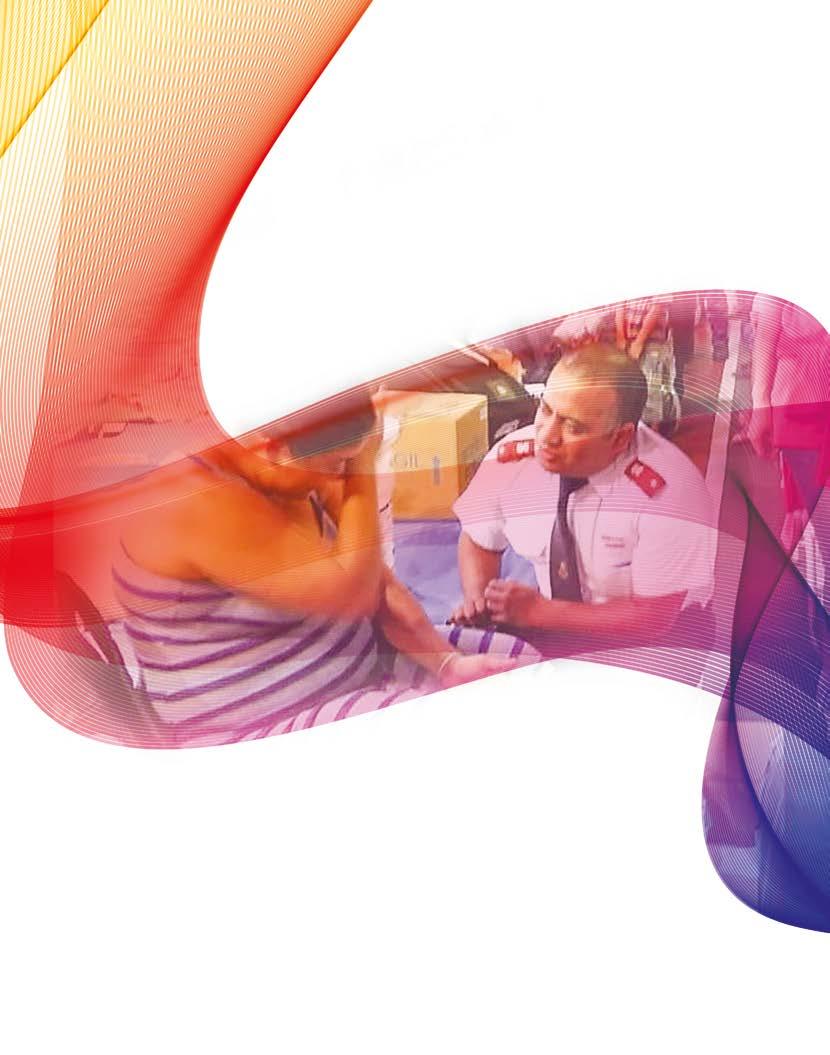
To respond to and help meet the needs arising from major crises.


The International Emergency Services (IES) team based at IHQ aims to support territories affected by disaster and crisis with assistance usually given when a location does not have all the necessary resources in place at that time to provide an appropriate response to the needs presented. Key objectives are to support territories through technical assistance, funding and trained personnel to enhance relief and recovery responses. A further goal for the year was to provide training courses to strengthen local capacity, particularly in disaster prone areas, and to assist in disaster preparedness and disaster risk reduction awareness.
EMERGENCY RESPONSE: IES provided support to territories responding to severe weather-related disasters such as Cyclones Yaas and Tauktae in India (May 2021), Typhoon Odette in the Philippines (December 2021) and the drought response in Madagascar (mid-2021) and Turkana, Kenya (early/mid 2021). The IES team also provided assistance to earth-related disasters such as the earthquake in Haiti (August 2021) and volcanic eruptions in St Vincent and the Grenadines (April 2021) and in Democratic Republic of Congo (May 2021). Support was also offered following man-made disasters such as the oil spill in Sri Lanka (June 2021), terrorist attacks and resulting displacement in Cabo Delgado, Mozambique (March/April 2021) and Solhan, Burkina Faso (June 2021), the social/civil unrest situation in Cuba (July 2021) and ongoing conflict situations in Myanmar and Nigeria.

The IES team provided support to multiple territories around the world affected by crisis and disaster, as illustrated by the following examples:
COVID-19 RESPONSE: Since the start of the pandemic in 2020 IES has facilitated the approval of 179 COVID-19 related projects spanning 77 countries in 48 territories. Whilst the majority of these projects started before April 2021, 27 new COVID-19 related projects were submitted and approved between April 2021 and March 2022. Many of them came from Indian territories responding to a massive spike in cases and deaths in May 2021. Typically projects focused on good hand and respiratory hygiene, Earthquake relief in Haiti
social distancing and the provision of some hygiene and sanitising materials. Other projects concentrated on food for vulnerable people, those in quarantine or without livelihood, due to the effect of the virus across society.
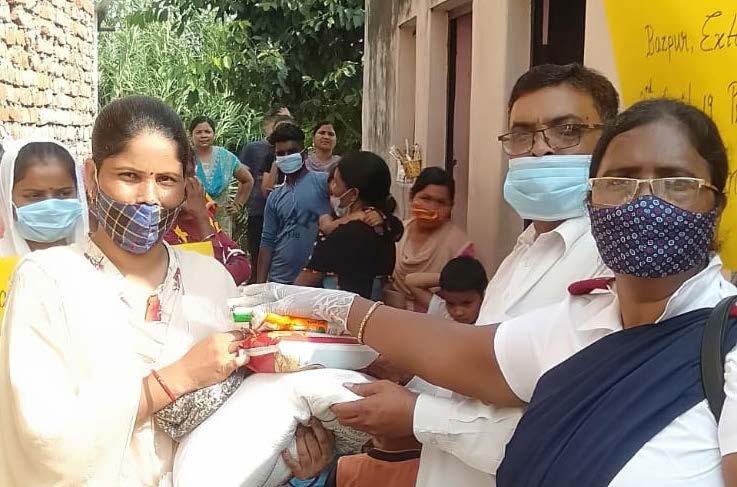
RUSSIA/UKRAINE WAR: As the reporting period came to an end, a new crisis took hold with the Russia/Ukraine conflict and resulting displacement of people across Europe. By 31 March 2022, IES had already approved 11 related projects covering Ukraine and also neighbouring countries including Moldova and Poland. The projects focused on immediate relief support offering food, hygiene items, hot meals, supermarket vouchers, emergency shelter and other needs. IES also deployed international emergency teams to Poland, Romania and Moldova to support local Salvation Army staff in their response.
TRAINING: Training courses usually feature in the annual programme of events and IES is always willing to support in the capacity strengthening of territories as they plan for disaster risk reduction and enhanced response activities. Due to COVID-19 restrictions no classroom training courses took place in 2021/22 however IES developed and delivered a new online training course which ran for the first time in February/March 2022 with 33 delegates from 26 territories. The training took place over eight weeks and included online live sessions, training by other organisations, reading and assignments and a mentorship programme with every delegate allocated an experienced mentor to walk alongside them on this journey of learning.
● IES facilitated the approval of 95 rapid response projects in 2021/22 providing immediate lifesaving activities and 18 further projects for longer term relief and recovery activities.
● Since the start of the pandemic in 2020 IES has facilitated the approval of 179 COVID-19 related projects spanning 77 countries in 48 territories.

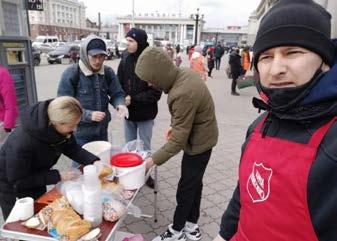
IES will continue to support territories affected by disaster and crisis, providing technical assistance, funding and trained personnel to support relief and recovery responses and mitigate continuing impacts of natural and man-made hazards and disasters.
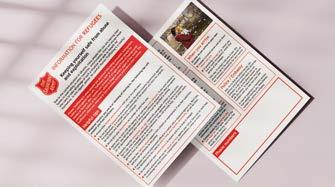
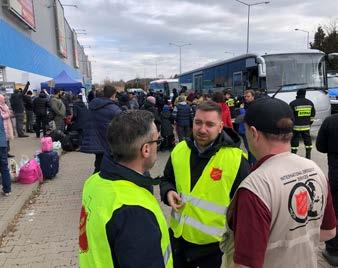
During 2022/23, IES will provide continued oversight, management and technical guidance regarding Russia/ Ukraine conflict response by The Salvation Army across Europe for as long as necessary. IES will also evaluate its recently developed online training materials and make decisions on the preferred mode and mechanism for future training delivery while also working to promote and support the development of Disaster Management Strategies for territories.

Army staff in their response.
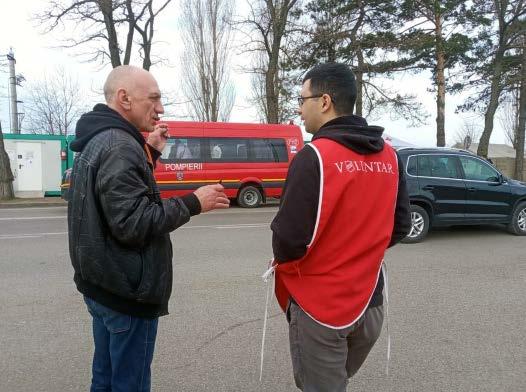
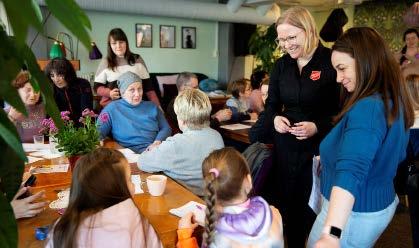
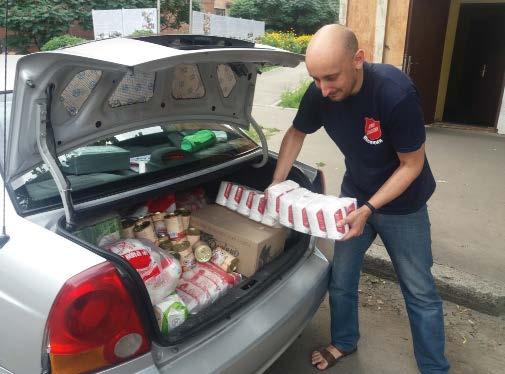
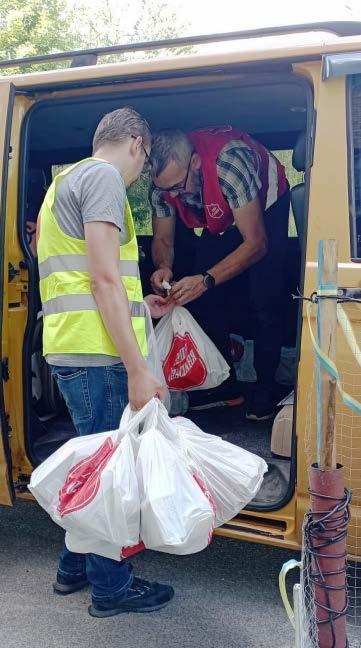

 Responses in Eastern Europe by the Salvation Army to the Ukraine crisis
Responses in Eastern Europe by the Salvation Army to the Ukraine crisis

To strengthen The Salvation Army’s capacity to support poor and marginalised people in accessing quality primary healthcare services as close to the family as possible.
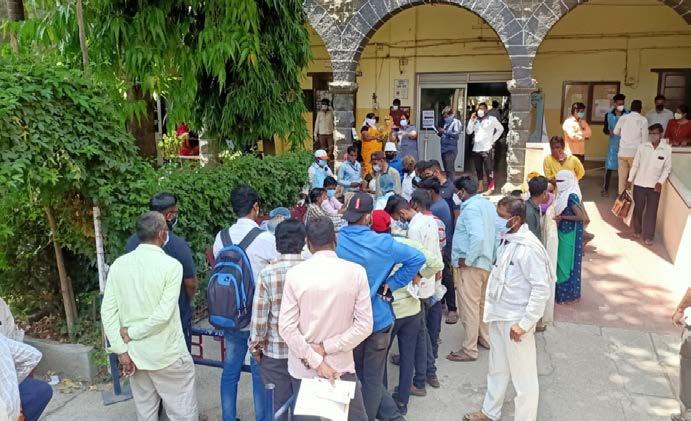

The International Health Services (IHS) desk at IHQ seeks to provide support, supervision and in-service training to healthcare facilities around the Salvation Army world. A major focus for 2021/22 was continued facilitation of COVID-19 response by resourcing of Salvation Army hospitals, clinics and other healthcare facilities to adapt to emerging needs while supporting medical and administrative staff to maintain quality health services.
The Salvation Army continues to be a significant provider of faith-based, integrated, high-quality care with services offered as close to the family as possible and a high focus on care for poor and marginalised members of communities. IHS provides technical support and supervision to clinics, hospitals and nursing/biomedical colleges around the world and also facilitates activation of projects funded either by the Trust, local donors or financially independent Salvation Army territories. The following examples illustrate this significant service provision:
ABOVE: Lifesaving assistance: new ventilation equipment at Evangeline Booth Hospital, India
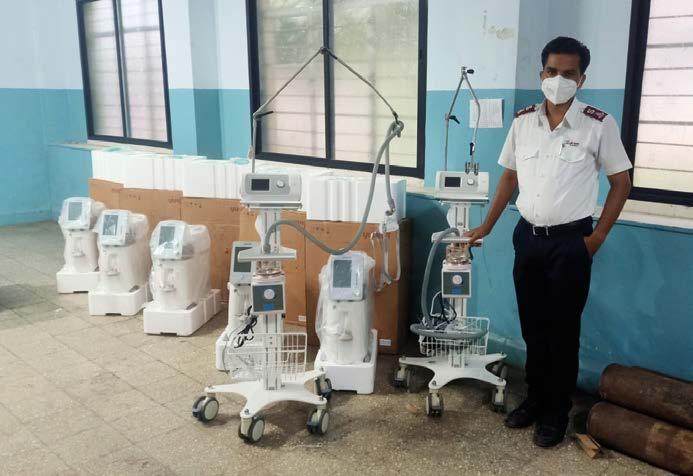
INDIA: The Evangeline Booth Hospital in Ahmednagar is the longest established facility in the area and it was at this Salvation Army hospital where the first COVID-19 patients of Ahmednagar District were treated at the start of the pandemic. The second wave of COVID-19 hit India very hard during the reporting year and as a result, many people lost their lives across the country. During this time relatives of COVID-19 patients were constantly and desperately searching the hospitals to find beds for treatment in Ahmednagar with a daily queue of more than 50 patients for admission at the Evangeline Booth Hospital. The biggest challenge was how to treat everyone who needed care. Despite being a 100-bed hospital, 170 patients were treated daily. Patients included many senior citizens, women and children. One of the initial problems at this time was the lack of oxygen concentrators and oxygen cylinders but due to high profile work, oxygen concentrators were provided by a number of different donors and this meant that many more patients could receive oxygen and subsequently their lives were saved.
During this critical time, IHS helped facilitate support to the hospital with a range of different resources funded either by the Trust or financially independent Salvation Army territories including ventilators, oxygen lines, medicines, staff salaries and running costs. This meant the Intensive Care Unit could start to function, thereby helping many people to survive COVID-19. The hospital also received local donations including a grant from the local government in appreciation of the selfless and outstanding service rendered to COVID-19-infected patients. Other gifts from local businesses and organisations included an oxygen production plant that could fill 100 cylinders a day, a mini ambulance for critical patients, hospital equipment and monetary donations. This demonstrated a community coming together for the common good to find local solutions to the pandemic in the local area. More than 6,700 COVID-19 patients have now been treated at the hospital with a mortality rate of less than one per cent. The hospital staff are commended for their selfless service, often given at great risks to themselves.
BANGLADESH: Andulia Clinic in the Southwest of Bangladesh is based 22 km away from the nearest hospital and is funded by local fees and grants from the Trust. It is estimated that 80 per cent of the community the clinic serves live in poverty and consequently are vulnerable when it comes to accessing healthcare. Andulia Clinic treats common diseases and with a high focus on mother and child care. Whilst an outpatient clinic, they also have a Maternity Centre for safe deliveries. The outpatient services currently available include diabetes care, minor surgeries, antenatal and postnatal care and emergency medical support. Alongside this, the clinic runs an ambulance, supporting community members through emergency care and transporting patients to the nearest city to ensure the necessary treatment is received. During the pandemic, when many clinics and institutions were forced to shut down or scale back, Andulia Clinic continued to operate at all times often in very difficult circumstances. As well as offering health services, the staff continued to conduct health training amongst the community to help prevent COVID-19 including targeted campaigns around hygiene, water and sanitation practices, the importance of mask wearing and isolating when COVID positive. Mothers and children in the community also received health awareness messages around the importance of immunisations for children and the importance of pregnant women attending the clinic to receive antenatal care.
GHANA: The Salvation Army runs many clinics in Ghana including the Urban Aid Health Centre situated in Maamobi, a densely populated area of greater Accra. The health centre was pivotal in the local COVID-19 vaccination exercise and roll out with many doses of vaccines given at the premises helping to protect the most vulnerable. During the year, the Ministry of Health of Ghana initiated a door-to-door campaign to boost uptake of COVID vaccines and Urban Aid Health Centre staff together with volunteers reached hundreds of people through door-to-door contacts. The health centre has vaccinated 10,672 people, making a lifesaving difference in its local community.
● During 2021/22, The Salvation Army’s 26 hospitals and 132 clinics around the world, with 5,667 healthcare professionals, delivered care to 361,785 inpatients and 831,129 outpatients.

● IHS personnel directly assisted 15 territories during 2021/22 monitoring operations, facilitating the activation of projects and providing technical support, help and advice.
IHS will continue to provide technical support and supervision to clinics, hospitals and nursing/biomedical colleges around the world, ensuring that all Salvation Army health programmes are technically sound, accountable, an integrated part of Salvation Army mission and meet required standards of the country where they are based.
IHS will facilitate increasing access to health information and education across all Salvation Army programmes (community, national, international) ensuring a relevant, holistic and integrated approach to all health-related work across different settings. The team will also work with territories to develop a more strategic approach to preventative health care in local communities and encourage partnership and mutual learning across Salvation Army health programmes, building relationships between Salvation Army medical, nursing and healthcare workers around the world.
IHS provides technical support and supervision to clinics, hospitals and nursing/ biomedical colleges around the world


To take action to combat the massive and growing evil of sexual trafficking and to create awareness of social injustice in the world.
To support victims of human trafficking, work to prevent people being trafficked and raise awareness of social injustice by building capacity in people, developing effective partnerships, sharing quality resources and promoting best practice. This year, a major aim was to build up modern slavery and human trafficking (MSHT) responses while also maintaining the work of the International Social Justice Commission (ISJC) and campaigning for social justice.
The ISJC, with its secretariat funded by the Trust and based in New York, United States, is The Salvation Army’s strategic voice advocating for human dignity, human rights and social justice in all parts of the world. The ISJC, with the International Moral and Social Issues Council (IMASIC), and the International Modern Slavery and Human Trafficking Response Council (IMSHTRC), exercises leadership in determining The Salvation Army’s policies and practices in the international social justice arena.
The ISJC works closely with those who have a track record of seeking God’s justice for the world, in order to learn from them, distil experience and share lessons with others. Areas of ISJC attention and global engagement include, though are not limited to, poverty, racism, sexism, refugees and asylum seekers, indigenous peoples, climate change, gender-based violence and MSHT. In the period under review, the following were notable achievements:
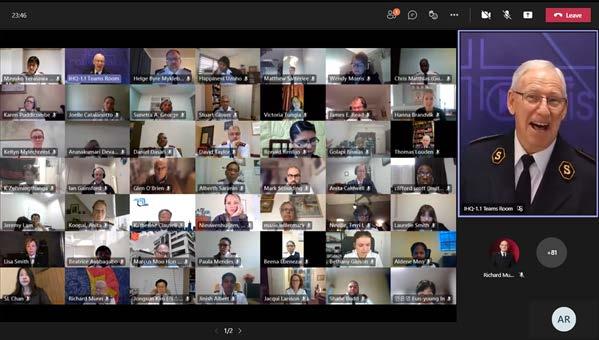
SURVEY OF SOCIAL JUSTICE CONCERNS: At the end of 2021 a large-scale global survey was undertaken to explore the main social justice concerns of the international

Salvation Army community (including soldiers, officers, employees, services users etc.). The aim of the project was to help provide an understanding of social justice topics of most concern both globally and by territory and in turn to guide the ISJC in topics of advocacy, territorial support and faith-based facilitation. More than 1,700 responses were received with, at the global level, MSHT recorded as the highest social concern, followed by domestic violence/abuse, racism and addiction.
The Salvation Army international response to MSHT around the world continued to evolve during 2021/22. This global, multi-layered response surrounding advocacy, prevention and intervention is a crucial part of the work of the ISJC. According to the 2018 Global Slavery Index more than 40 million men, women and children are victims of modern slavery on any given day. Of these, almost 35 million people are in forced labour and more than 15 million people are living in a forced marriage. Women and girls are vastly over-represented in these figures, making up 71 per cent of victims. The Salvation Army is deeply committed to fighting MSHT with a theological and historical mandate, and is uniquely equipped and has a role to play in this vital work.
A particular focus for the year in review was on learning how to create spaces and opportunities so that everyone everywhere can participate in God’s mission of responding to MSHT. Together with the IMSHTRC, the ISJC worked towards implementing a new system and structure for the coordination of Salvation Army MSHT response, aiming to strengthen capacity for a strong response across the global Salvation Army, based on a Freedom Action Framework of key response areas: prayer, prevention, protection, prosecution, partnerships, policy, proof. The MSHT response was targeted towards four main outcomes:
Establishing an international system of coordination active with appointed Modern Slavery and Human Trafficking Response (MSHTR) personnel and teams leading, coordinating and stewarding this work worldwide.
Recognising everyone, everywhere has a role and place in responding to MSHT and no matter where you live and what language you speak, you are needed. Ensuring, around the world, The Salvation Army is growing in awareness and being equipped to recognise the signs within its local communities.
As part of this work a support booklet Changing Behaviours to Prevent Modern Slavery and Human Trafficking was launched to act as a guide to prepare The Salvation Army international community to go deeper in awareness-raising conversations within programmes, projects and communities.
Building internal capacity within territories to practically address MSHT as it presents itself locally.
Recognising The Salvation Army’s greatest strength is people and growing a seamless global network between territories, contact people and practitioners based on communities of practice which are coordinated regionally and internationally.
UNITED NATIONS: The ISJC, reflecting the international Salvation Army, also campaigns for a holistic understanding of people and an integrated global plan for fair, sustainable and equitable development for all nations. The Salvation Army has been an affiliated non-governmental organisation (NGO) with the United Nations (UN) since the UN’s
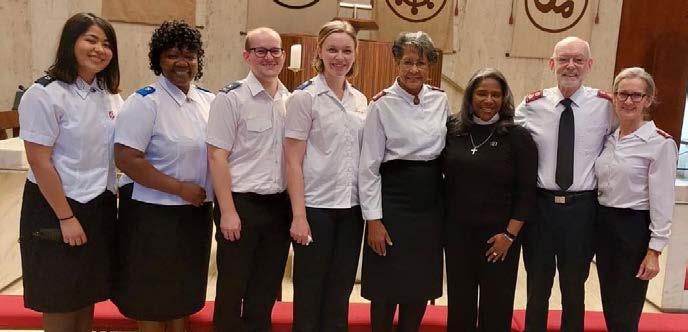
formation. As one of the founding NGOs, The Salvation Army holds ‘consultative status’ at the UN and may formally contribute to its work in conjunction with other nongovernmental, non-profit, public or voluntary organisations and faith-based organisations with similar status. If The Salvation Army wants to continue to have a voice in the global community, it is essential that Salvationists are present at the table and have global and up-to-date knowledge of issues. During the year under review, the ISJC
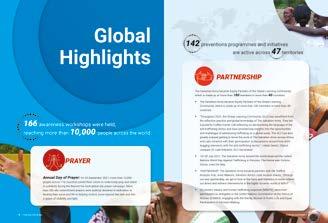
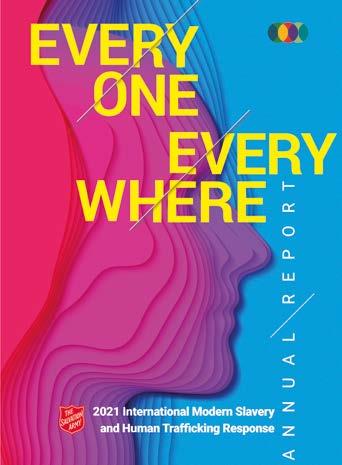
represented The Salvation Army at the UN (and numerous other bodies) seeking to build strong alliances to end extreme poverty and promote sustainable development. The ISJC engages by attending open (public) official meetings, submitting written statements prior to sessions, meeting official government delegations and making oral statements on behalf of The Salvation Army during general discussions and interactive events. More details relating to ISJC engagement with the UN and other bodies plus additional resources can be accessed from the dedicated ISJC web page at: https://www.salvationarmy.org/isjc/ISJCUN
SOCIAL MEDIA: The ISJC social media platforms were also actively used during 2021/22 to provide a framework to demonstrate the international work of The Salvation Army and to share outcomes with governments and other partners. Most notably, new resources were developed and shared exploring issues around MSHT response and the impact of COVID-19 upon justice. Resources can be accessed from the ISJC website at: https://www.salvationarmy.org/ isjc/resource

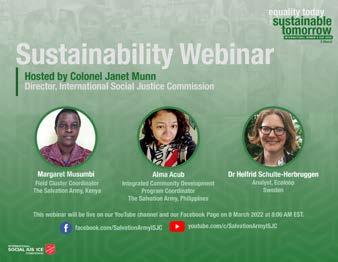

● The Salvation Army is active in responding to MSHT in 108 countries with 142 prevention programmes and initiatives underway across 47 territories.
● Globally, 79 MSHT survivor leaders are part of The Salvation Army serving as officers, consultants, corps members, employees, mentors, volunteers, advocates and advisory board members.

The ISJC will continue to act as the strategic voice of The Salvation Army advocating for human dignity, human rights and social justice in all parts of the world. Partnering closely with those who have a record of seeking God’s justice for the world, the ISJC will seek to both learn and contribute from a strong Salvation Army worldview. The Salvation Army will continue to partner with other religious groups, other NGOs, the UN, the World Bank Group and others towards the vision of a world where all people can experience life in all its fullness.
The ISJC will also work with territories to continue to develop locally relevant MSHT response strategies, particularly in areas where existing capacity is low and poorly resourced. A particular focus for 2022/23 will be to appoint MSHTR Divisional Resource Persons, launch international MSHTR core values and strengthen systems for participatory monitoring, measurement and shared learning approaches for all MSHTR expressions. Plans are also in place to launch an International Social Justice Survivor Network being a group of survivor leaders all over the world, organised to speak up about matters concerning responding to MSHT both within The Salvation Army and through external advocacy efforts.

Group accounts for The Salvation Army International Trust, incorporating Reliance Bank Limited and The Salvation Army Leaders Training College of Africa and Resource Centre Limited as subsidiaries of the Trust, are presented for 2021/22 as well as charity results, assets and liabilities for The Salvation Army International Trust (see pages 64 to 92 for the accounts). The Group accounts reflect notable differences to the charity only results most especially for investments, debtors and prepayments, bank balances and current liabilities (see Notes 25-28 to the Accounts). The Group Accounts exclude SAITCo which is the managing trustee.
The commentary below relates to the charity only results for The Salvation Army International Trust with separate comments offered on the subsidiaries and Group accounts in the labelled section on page 59.
The net movement in funds for the year ended 31 March 2022 decreased by £39.84 million, moving from £51.38 million (2021) to £ 11.54 million (2022). Variances contributing to the total net movement in funds are outlined below.
The primary income streams of the Trust are donations from Salvation Army territories to the International SelfDenial Fund to support the work of the global Army and Headquarters Support contributions from Salvation Army territories to fund the operation of IHQ.
Total income decreased from £53.26 million (2021) to £44.61 million (2022). External donations and legacies decreased from £7.98 million (2021) to £ 0.23 million (2022) as no significant donations were received from external donors in 2022. Contributions from Salvation Army territories to the International Self-Denial Fund decreased slightly from £25.42 million (2021) to £24.85 million (2022) with most territories able to maintain funding levels to IHQ despite ongoing COVID-19 impacts during the year. Donations from Salvation Army territories decreased from £4.84 million (2021) to £3.74 million (2022) and Headquarters Support funding from Salvation Army territories showed little movement from £9.74 million (2021) to £10.09 million (2022).
Investment income decreased slightly from £4.69 million (2021) to £4.65 million (2022) while income from charitable activities and trading income showed year-on-year increases of £65,000 and £70,000 respectively reflecting the impact of COVID-19 lockdowns easing during the year. Gains on disposal of properties increased from £122,000 (2021) to £453,000 (2022) with one functional property sold during 2022 and one during 2021.
No qualifying charitable donation was received from Reliance Bank Limited in 2022 or the preceding year, as the Bank incurred losses partly as expected during this implementation period of the strategic plan, and partly in response to the challenges of the global pandemic.
The following pie charts illustrate the sources of income for 2021/22 and also contributions to the International Self Denial Fund:

Income from charitable activities and trading income showed year-on-year increases of £65,000 and £70,000 respectively


Expenditure across the six charitable activities in which The Salvation Army International Trust is engaged is detailed in Note 10 in the Accounts. Spending on charitable activities totalled £47.32 million (2022) representing a decrease of £3.84 million on the previous year. Financial assistance to Salvation Army territories decreased from £35.20 million (2021) to £30.48 million (2022) as requests for additional grants to meet needs of territories arising from the COVID-19 crisis began to reduce.
Expenditure of £9.43 million (2022) was also incurred on International Personnel and Development, £4.23 million (2022) on World Mission and £1.74 million (2022) on Crisis Relief, reflecting the cost of some of the strategies in which the Trust is engaging, as referenced earlier in this report. The cost of raising funds, relating primarily to investment management costs and the cost of letting of property, remained relatively flat with a small increase from £1.66 million (2021) to £1.76 million (2022).

The following pie charts illustrate 2021/22 expenditure on charitable activities and also the geographic spread of support of overseas work:

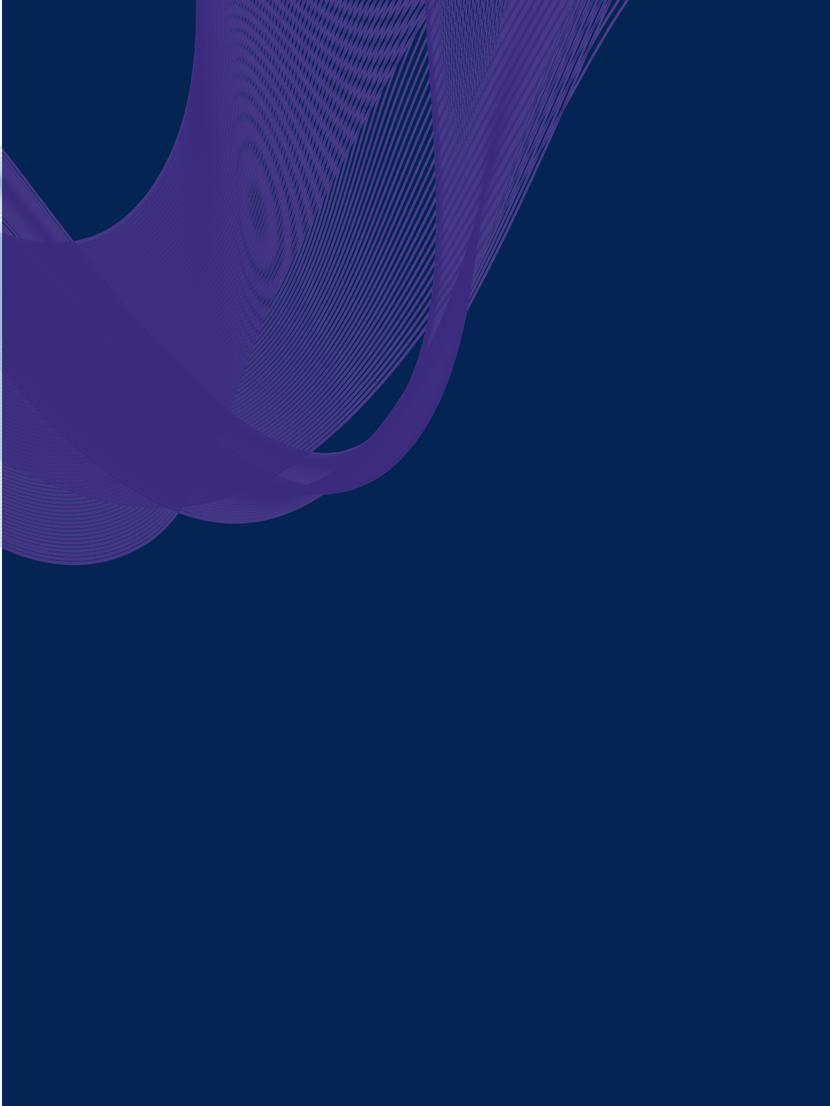

Other notable variances contributing to the total net movement in funds include, most notably, net gains on investment assets which decreased by £35.19 million from £51.21 million (2021) to £16.02 million (2022) reflecting market conditions and representing both the realised and unrealised gains arising on sales and the market value of investments held at year end. There were no additional employer contributions made to the defined benefit pension scheme during the year as the latest actuarial review reported a surplus.
The net movement in funds for the year ended 31 March 2022 was £11.54 million with a surplus on unrestricted funds of £12.64 million and a deficit of £1.10 million on restricted funds. Total funds of £347.23 million were held at year end.
The Trustee seeks to maintain the strong financial position of the Trust and will continue to explore means to increase the scale and scope of charitable activities while continuing to encourage Salvation Army territories to move towards financial self-reliance through provision of targeted financial support and other resources.
Emergency COVID-19 response is expected to reduce as territories move out of restrictions imposed and back to a level of normality during 2022/23 with the Trust providing a reduced amount of COVID-19-related additional funding to territories to support salaries, officers’ allowances and other operational costs to ensure continuation of The Salvation Army’s mission.
The two large scale international projects currently underway will materially impact the Accounts of the Trust during 2022/23 and subsequent years being the roll out of a new global email solution and implementation of cloudbased accounting software to all financially supported territories. Several material property grants may also be issued during the next year with multiple projects awaiting planning consents and final approval.
The Trustee reviews the financial plans of the Trust on an ongoing basis as part of a programmed budget cycle including consideration of principal financial risks, also receives and reviews cashflow forecasts identifying any liquidity risks. The Trustee recognises the material pension liability arising from participation of the Trust in The Salvation Army Employees’ Pension Fund (see Note 17 in the Accounts) and is well placed to meet its obligations in this regard.
The operation of the Trust and ability to meet the objectives outlined throughout this report are recognised as impacted by the ongoing COVID-19 crisis, Ukraine/Russia crisis with associated global and national economic impact, inflationary pressures and other external events. Since 31 March 2022 to the date of signing of these financial statements the impact of the crises has had a significant economic impact across all sectors and the Trustee has considered the effect on the Trust as a going concern, its resilience through this period and the effect on the assets and funds of the Trust.
In addition to the operations of the Trust, SAITCo is actively monitoring the impact of the COVID-19 crisis and Ukraine/
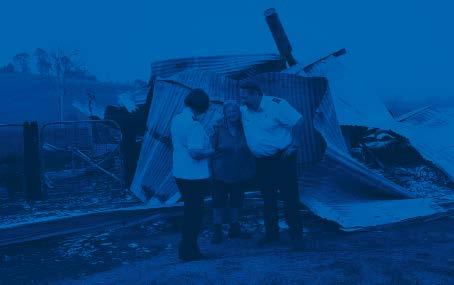
Russia crisis in particular upon Salvation Army territories with multiple working parties undertaking tasks in specific areas and regular updates provided to the Board considering the impact of the crises upon global Salvation Army operations, the financial position of the Trust, the reserves policy of the Trust, the investment portfolio of the Trust and associated logistical matters.
The Trust holds a strong balance sheet with availability and liquidity of cash and unrestricted investments with, for example, current liabilities including amounts due to Salvation Army territories at the 2021/22 year end totalling £8.23 million against net current assets of £39.81 million of which £36.34 million is held in highly liquid current asset investments and cash at bank.
The Trustee is confident the Trust is well placed to meet the COVID-19 crisis and Ukraine/Russia crisis, with associated global and national economic impact, inflationary pressures and continue to achieve its grant-making and other objectives due to its strong financial position, investment strategy and reserves policy (see below) all underpinned by the governance structures of SAITCo.
The Trustee continues to monitor developments closely in relation to the COVID-19 crisis, Ukraine/Russia crisis and other external events and remains confident that the level of reserves held is adequate in the changing economic climate and does not impact adversely on the Trust’s going concern status. The Trustee is satisfied that the Trust has sufficient
Listed investments (see Note 25 in the Accounts) are managed under the terms of an investment management agreement with Sarasin & Partners LLP. The investment manager is required to make investments on behalf of the Trust in line with benchmarks that have been set and against which performance is measured.
The Investment Committee which sits to review investment performance receives periodic reports on matters pertinent to its investment policy and this facilitates discussion which, in turn, enhances the committee’s understanding of the relationship between its Christian conviction and ethos and investment return; and even more importantly, the positive effect that its policy can have on companies which themselves may (or may not) be seeking to improve conditions in many parts of the world. The reports are tabled at full board meetings so that those directors who do not sit on the Investment Committee have an opportunity to add to the debate and have greater understanding of the issues that the Trust can tackle through its investment policy. SAITCo has established an ethical investment policy to reflect The Salvation Army’s ethical and moral stance which is required to be followed by the appointed investment manager. No breaches to this policy have been reported to SAITCo during the year.
resources to continue operating for the foreseeable future following review by the Audit Committee of a going concern assessment to March 2024. The Trustee has not identified any material uncertainties related to going concern and the accounts are therefore prepared on a going concern basis.
Therefore, this policy excludes investment in companies which derive more than 10% of their revenues in aggregate from any of the following categories:
a. the production and/or sale of alcohol
b. the production and/or sale of tobacco
c. the manufacture and/or sale of whole weapons, weapon platforms and weapon systems
d. the manufacture and/or sale of strategic parts for weapon systems
e. the promotion or operation of gambling enterprises
f. the provision of adult entertainment services
g. the publication and/or sale of pornographic media
h. the extraction of thermal coal or the production of oil from tar sands
For the avoidance of doubt in relation to sub-paragraphs (c) and (d) above, ‘weapons’ refers to both nuclear and conventional weapons. In addition, investment is excluded in companies with disregard for human rights and/or the pollution of the environment. The following table gives the long-term ranges and current weightings expressed in percentages of the Trust’s investment funds:
For the year ended 31 March 2022, the portfolio total return amounted to +6.2% against an ethically adjusted benchmark return of +7.9%.
Global equity markets continued to make progress throughout 2021 as economies recovered from the COVID-19 pandemic but lost some ground in the first three months of 2022, owing to the prospect of rising interest rates to combat persistently high inflation and the outbreak of war in Ukraine. The bond allocation was kept at the lower end of the permitted range as bonds continued to perform poorly against this backdrop. Cash levels remained slightly higher than the top of the permitted range which is in the process of being extended to 10% in anticipation of future withdrawals and the more uncertain economic outlook.
Investment strategy going forward will continue to be closely monitored by the Investment Committee in response to the prolonged inflationary environment currently being experienced and other emergent market conditions.


In supporting The Salvation Army’s work overseas, territories, commands and regions produce annual budget proposals, covering all aspects of their operations that are reviewed at IHQ. Annual grants from the Trust to territories are considered as part of the annual IHQ budget process with proposals reviewed by the International Finance Board, approved by SAITCo and then paid quarterly in advance to each financially supported territory, command, and region (see Note 11 in the Accounts).
Payments from IHQ to territories are made according to the terms of an International Payments Procedure Manual for IHQ (reviewed and updated in March 2022 ) which outlines controls over banking transfers, assessment of overseas banking institutions for risk, identification and assessment of situations where funds paid to territories may be remitted on to third parties, controls over international payments direct to overseas suppliers, controls over transporting and controlling cash overseas and prohibitions on use of nonmainstream banking money transfer organisations.
The total funds of the Trust at 31 March 2022 amounted to £347.23 million comprising £27.56 million in restricted funds and £319.67 million in unrestricted funds which includes £287.28 million in designated funds. The General Reserve
held £5.50 million at year end which is at the target level for free reserves. The Trustee continues to keep the matter of reserves under review, with a project ongoing to reduce the number of different funds held and examine any historic funds with minimal movement in the past few years, mindful of the legislative framework in place and applicable updates to charity law.
A restricted fund can only be used for a specific charitable purpose. The restriction may be declared by the donor when making the gift. Restricted funds held by the Trust include territorial donations and legacies specified for international use. Where possible the intention continues to be to use restricted donations and legacies in the year of receipt, except where the gift is sufficiently large to be used over a longer period or is used for support of multi-year programmes.
The Self-Denial Fund Reserve represents amounts held to ensure sufficient funds are available to make operational grants to supported territories that are paid in advance on a quarterly basis. The aim of the Trustee is for the balance on this Reserve to be sufficient to fund one year’s expenditure in support of overseas work. The balance as at 31 March 2022 of £24.69 million is equivalent to 12.4 months’ expenditure. The Investment Appreciation Fund (£96.44 million) represents unrealised gains on investments which are still subject to market risk and the Investment Property Revaluation Fund (£45.15 million) represents the surplus on revaluation of tenanted properties held for investment purposes.
Other material designated amounts at 31 March 2022 relate to a reserve held to fund future replacement of the IHQ building (£19.33 million), a Property Commitments Reserve (£3.34 million) held to fund property acquisitions by the Trust and an International Property Project Reserve (£5.79 million) held to provide additional property project funding to territories over the next 2-3 years.
Other Designated Funds include reserves of £47.73 million supporting the balances held and invested in the USA on behalf of SAIT to generate income for specific purposes. These are Medical Services Support (£8.64 million), Schools Services Support (£4.20 million) and the Officers Support Endowment Fund (£34.89 million). In addition, an International Financial and Accounting Standards Implementation Reserve (£7.62 million) is held to fund provision of cloud-based accounting software to territories over the next 2-3 years and an IT Development Reserve (£4.45 million) is held to fund provision of a new global email solution to territories over the next 2-3 years.
An International Schools Development Reserve (£7.57 million) is held to provide additional schools project funding to territories over the next 2-3 years with a Leadership Development Reserve (£3.59 million) held to fund the enhancement of training and personal development for Salvation Army officers over the next 3-4 years. An Exchange Equalisation Reserve (£4.88 million) is held to fund exchange losses and a Mission Support Reserve (£2.81 million) is held to provide additional project funding to territories over the next 2-3 years. Four designated COVID-19 reserves (£2.41 million) were established to fund responses to the pandemic and are expected to be utilised within the next two years.
The General Reserve represents the working capital required to fund the day-to-day needs of the Trust. The aim of the Trustee is for the balance on the General Fund Reserve to cover equivalent to 6.0 months expenditure on headquarters administration costs, providing the Trust with adequate
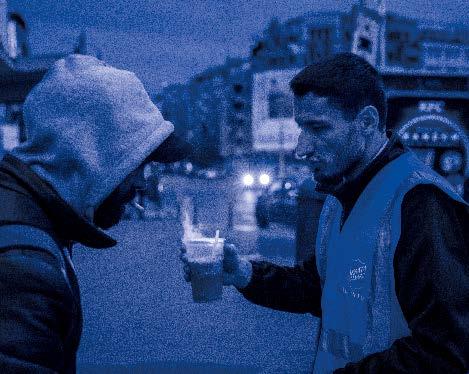
working capital. The current balance of £5.50 million is at the target level for free reserves, being equivalent to 6.0 months expenditure.
The Trustee acknowledges its responsibilities relating to the management of risk. A formal risk management programme continues to operate allowing risks to be identified, classified and prioritised in terms of potential occurrence and impact. The Board of Directors of SAITCo has appointed a Risk Management Committee, consisting of eleven members, which is chaired by an external legal/risk advisor and includes an Independent Non-Executive Director of SAITCo.
A Risk Manager has been appointed and a Risk Register is maintained and kept under regular review by the Risk


Manager and the Risk Management Committee. The Risk Management Committee works with the Risk Owner of each major risk to ensure acceptable action is taken to manage the risk and to establish suitable systems to reduce the likelihood of harmful outcomes occurring and the impact on the organisation should they occur.
In addition to the above framework, a range of emergency protocols are in place allowing SAITCo to actively monitor the impact of the COVID-19 crisis and the Ukraine/Russia crisis upon the operations of the Trust as well as those of Salvation Army territories with multiple working parties
A serious safeguarding incident resulting in harm to a child or vulnerable adult and subsequent reputational damage to the local/ international Salvation Army.
National economic and/or political crises adversely impacting Salvation Army operations in a territory prompting additional emergency support from IHQ.
Negative/adverse publicity affecting public perception of The Salvation Army internationally.
undertaking tasks in specific areas and regular updates provided to the Board considering the impact of the crises upon global Salvation Army operations, the financial position of the Trust, the reserves policy of the Trust, the investment portfolio of the Trust and associated logistical matters.
The main risks and uncertainties faced by the Trust, as detailed in the Risk Register at the end of the financial year under review, are outlined below in top-down priority order together with a summary of the mitigating strategies being pursued to manage these risks:
Ongoing development of safeguarding policies and procedures for IHQ and all Salvation Army territories. IHQ support offered to territories to address safeguarding incidents involving child protection and legal specialists.
Continuous IHQ monitoring of economic and political contexts on a country-by-country basis. Development of crisis management protocols for IHQ interventions.
Communications Office at IHQ to monitor global press coverage and manage media relationships in consultation with Salvation Army territories.
IHQ support for territories impacted by national government controls targeted at foreign NGOs and/or Christian organisations.
Continuous IHQ monitoring of national political contexts on a country-by-country basis. External consultants and/or legal counsel offer training, resources and advice to IHQ staff to address specific circumstances.
Risk exposure to SAITCo and SAIT due to sole ownership of Reliance Bank Limited including financial and reputational risk.
An additional Director with banking expertise was recruited to the SAITCo Board in May 2019 and remains in post with two shareholder representatives appointed to the Bank board and additional performance and risk reporting mechanisms in place from the Bank to SAITCo.
Lack of effective financial controls and monitoring in territories resulting in demands for additional IHQ financial support and/or reputational damage to the local/international Salvation Army.
Continuous IHQ monitoring of global operations on a territory-by-territory basis. A suite of policies and procedures in place detailing required financial controls. Internal audits undertaken periodically depending on the extent of perceived risk.

The banking company, Reliance Bank Limited (the ‘Bank’), is a wholly owned subsidiary of the Trust. The Bank has incurred losses for the full financial year, reflecting its continued investment in its organisational structure and systems, and also the impact of the global pandemic and low interest rates.
Despite the impact of successive lockdowns on the Bank and its customers (individuals and businesses) the Bank continued to lend money to those who met its criteria throughout the COVID-19 pandemic. The Bank provided temporary financial support to individuals and businesses during this period and suffered no losses.
The continued focus is to grow the loan portfolio to boost income levels and return to profitability. The priority of the business lending is focussed on supporting communities, churches, healthcare services and the education sector. During the year the Bank began to add more social housing providers to the portfolio; the Salvation Army Housing Association is a long-standing customer. In 2020 the Bank introduced a Key Worker mortgage looking to support those who supported us during the pandemic, and this, together with the Shared Ownership offering, form the basis of the social impact of the mortgage book. In this way, the Bank enables home ownership for those who could not afford a sizeable deposit to buy the whole residence outright. The Bank has a small portfolio of mortgages secured on properties which have been specifically altered to accommodate disability.
The mortgage book grew by 22% to £47 million in the year, providing the Bank with an important revenue stream. Loans to organisations grew 27% to £49 million and over £54 million of Bank lending was classified as social impact lending up from £35 million last year.
In the year to 31 March 2022, growth of the loan book resulted in an increase in net interest income of 29% to £3.1 million. Administrative costs remained comparable to the prior year, but no restructuring expense was incurred (£0.5m of exceptional costs in 2021). The Bank’s performance for the year ended 31 March 2022 was a loss of £0.8 million (2021: loss of £1.8 million).
During the year, the Bank received £3 million in additional capital from the Trust to support its strategic plan against the background of the global pandemic, ultra-low interest rates and the Bank’s investments in systems and resources. After the operating loss and additional investment, the Bank’s capital and reserves increased by £2.2 million (2021: increased by £0.5 million) to £14.4 million. Owing to the Bank’s’ loss position this year no Gift Aid donation was made to the Trust (2021: £nil).
The Bank’s total assets at 31 March 2022 remained broadly similar to last year at £251 million (2021: £244 million) split between loans to customers and balances held with other financial institutions, including the Bank of England. Balance sheet growth is primarily driven by customer deposits which increased to £236 million (2021: £232 million). The Bank continues to maintain very strong liquidity levels. The Bank has not recorded any loan losses from its mortgages or business lending during the year. The Bank has a low appetite for credit risk and has only incurred £7k of loan losses in the last five years, all of which related to unsecured personal lending.
The year ahead is expected to have different challenges for the Bank, with the impact of the global pandemic making way for inflationary pressures and increased interest rates. These challenges are reflected in the Bank’s forecasts and the robust medium-term plan in place to return to profitability. The Bank continues to be focused on delivery of loan growth and investment in its resources and systems, to support the Bank’s vision and demonstrate its social impact.
The Salvation Army Leaders Training College of Africa and Resource Centre Limited (‘SALT College’) is a wholly owned subsidiary of the Trust.
During 2020/21 a restructuring was progressed for SALT College, a training facility in Nairobi, Kenya, for Salvation Army territories in Africa that had hitherto been operated and managed as an integral part of the Trust. This was registered in Kenya as a separate legal entity controlled by SAITCo to which the Trust transferred assets and so, from 1 August 2020 and during the year under review (2021/22), is no longer reported within the charity only accounts of the Trust but within the Group accounts. The assets transferred from the Trust to the new entity in the sum of £26,309 are not material to the Trust.
The Group accounts reflect operations of the new entity from 1 April 2021 to 31 March 2022. The new entity held net assets on the Group balance sheet of £293,000 up from £30,000 (2021) at the year end.
During the reporting period, the college offered adult distance learning subjects in four major languages at foundation, certificate and diploma levels, to more than 11,000 registered students across the continent of Africa.
A college website and bespoke student learning resources portal was developed during 2021/22 with a focus for the year ahead upon further enhancing online resources and providing tutors and student support personnel with additional training.
The Group accounts comprise the results of The Salvation Army International Trust plus the subsidiary companies Reliance Bank Limited and The Salvation Army Leaders Training College of Africa and Resource Centre Limited for the period 1 April 2021 to 31 March 2022.
The net movement in funds for the Group showed a decrease of £38.89 million. Net goodwill at year end amounted to Negative £4.04 million as set out in Note 22 to the Accounts.
Total fixed assets including investments amounted to £322.26 million. Net current assets were £26.06 million. Total funds of the Group amounted to £344.21 million at year end as set out in Note 20 to the Accounts.
A going concern assessment has been undertaken for The Salvation Army International Trust, Reliance Bank Limited and Salvation Army Leaders’ Training College of Africa & Resource Centre Limited. The Trustee is satisfied the Group has sufficient resources to continue operating for the foreseeable future. The Trustee has not identified any material uncertainties related to going concern and the Group accounts are therefore prepared on a going concern basis.

The Trustee is responsible for preparing the Annual Report and the financial statements in accordance with applicable law and regulations.
Charity law requires the Trustees to prepare financial statements for each financial year in accordance with United Kingdom Generally Accepted Accounting Practice (United Kingdom Accounting Standards and applicable law). Under The Charity Law the Trustee must not approve the financial statements unless they are satisfied that they give a true and fair view of the state of affairs of the charity and of the incoming resources and application of resources, including the income and expenditure, of the charity for that period.
In preparing these financial statements, the Trustee is required to:
● select suitable accounting policies and then apply them consistently;
● make judgements and accounting estimates that are reasonable and prudent;
● state whether applicable UK Accounting Standards have been followed, subject to any material departures disclosed and explained in the financial statements; and
● prepare the financial statements on the going concern basis unless it is inappropriate to presume that the charity will continue in business.
The Trustee is responsible for keeping adequate accounting records that are sufficient to show and explain the charity’s transactions and disclose with reasonable accuracy at any time the financial position of the charity and enable them to ensure that the financial statements comply with the Charities Act 2011. They are also responsible for safeguarding the assets of the charity and hence for taking reasonable steps for the prevention and detection of fraud and other irregularities.
The Trustee has approved this 2021/22 Annual Report and Accounts on this basis.
Financial statements are published on the charity’s website in accordance with legislation in the United Kingdom governing the preparation and dissemination of financial statements, which may vary from legislation in other jurisdictions. The maintenance and integrity of the charity’s website is the responsibility of the trustee. The trustee’s responsibility also extends to the ongoing integrity of the financial statements contained therein.
For and on behalf of the directors of The Salvation Army International Trustee Company:
 Dr Matthew Carpenter BA, MBA, DBA, MCMI Company Secretary 27 January 2023
Dr Matthew Carpenter BA, MBA, DBA, MCMI Company Secretary 27 January 2023
In our opinion, the financial statements:
● give a true and fair view of the state of the Group’s and of the Parent Charity’s affairs as at 31 March 2022 and of the Group’s and the Parent’s incoming resources and application of resources for the year then ended;
● have been properly prepared in accordance with United Kingdom Generally Accepted Accounting Practice; and
● have been prepared in accordance with the requirements of the Charities Act 2011 and The Salvation Army Act 1980.
We have audited the financial statements of The Salvation Army International Trust (‘the Parent Charity’) and its subsidiary (‘the Group’) for the year ended 31 March 2022 which comprise the consolidated statement of financial activities, the statement of financial activities (charity only), the consolidated balance sheet, the consolidated cash flow statement and notes to the financial statements, including a summary of significant accounting policies.
The financial reporting framework that has been applied in their preparation is applicable law and United Kingdom Accounting Standards, including Financial Reporting Standard 102 The Financial Reporting Standard applicable in the UK and Republic of Ireland (United Kingdom Generally Accepted Accounting Practice).
We conducted our audit in accordance with International Standards on Auditing (UK) (ISAs (UK)) and applicable law. Our responsibilities under those standards are further described in the Auditor’s responsibilities for the audit of the financial statements section of our report. We are independent of the Group and the Parent Charity in accordance with the ethical requirements relevant to our audit of the financial statements in the UK, including the Financial Reporting Council’s (FRC) Ethical Standard, and we have fulfilled our other ethical responsibilities in accordance with these requirements. We believe that the audit evidence we have obtained is sufficient and appropriate to provide a basis for our opinion.
We have nothing to report in respect of the following matters in relation to which the ISAs (UK) require us to report to you where:

● the Trustee’s use of the going concern basis of accounting in the preparation of the financial statements is not appropriate; or
● the Trustee has not disclosed in the financial statements any identified material uncertainties that may cast significant doubt about the Group or the Parent Charity’s ability to continue to adopt the going concern basis of accounting for a period of at least twelve months from the date when the financial statements are authorised for issue.
The other information comprises the information included in the Report and Accounts, other than the financial statements and our auditor’s report thereon. The other information comprises: The Trustee’s Report, Direct Contributions from Territories Towards Special Projects and The Salvation Army Worldwide Facts and Figures.
The Trustee is responsible for the other information. Our opinion on the financial statements does not cover the other information and, except to the extent otherwise explicitly stated in our report, we do not express any form of assurance conclusion thereon.

In connection with our audit of the financial statements, our responsibility is to read the other information and, in doing so, consider whether the other information is materially inconsistent with the financial statements, or our knowledge obtained in the audit or otherwise appears to be materially misstated. If we identify such material inconsistencies or apparent material misstatements, we are required to determine whether there is a material misstatement in the financial statements or a material misstatement of the other information. If, based on the work we have performed, we conclude that there is a material misstatement of this other information, we are required to report that fact.
We have nothing to report in this regard.
We have nothing to report in respect of the following matters in relation to which the Charities Act 2011 requires us to report to you if, in our opinion;
● the information contained in the financial statements is inconsistent in any material respect with the Trustees’ Annual Report; or
● adequate accounting records have not been kept by the Parent Charity; or
● the Parent Charity financial statements are not in agreement with the accounting records and returns; or
● we have not received all the information and explanations we require for our audit.
As explained more fully in the Statement of Trustee’s Responsibilities, the Trustee is responsible for the preparation of the financial statements and for being satisfied that they give a true and fair view, and for such internal control as the Trustee determines is necessary to enable the preparation of financial statements that are free from material misstatement, whether due to fraud or error.
In preparing the financial statements, the Trustee is responsible for assessing the Group’s and the Parent Charity’s ability to continue as a going concern, disclosing, as applicable, matters related to going concern and using the going concern basis of accounting unless the Trustee either intends to liquidate the Group or the parent Charity or to cease operations, or have no realistic alternative but to do so.
We have been appointed as auditor under section 144 of the Charities Act 2011 and report in accordance with the Act and relevant regulations made or having effect thereunder.
Our objectives are to obtain reasonable assurance about whether the financial statements as a whole are free from
material misstatement, whether due to fraud or error, and to issue an auditor’s report that includes our opinion. Reasonable assurance is a high level of assurance but is not a guarantee that an audit conducted in accordance with ISAs (UK) will always detect a material misstatement when it exists. Misstatements can arise from fraud or error and are considered material if, individually or in the aggregate, they could reasonably be expected to influence the economic decisions of users taken on the basis of these financial statements.
A further description of our responsibilities for the audit of the financial statements is located at the Financial Reporting Council’s (FRC) website at:
https://www.frc.org.uk/auditorsresponsibilities. This description forms part of our auditor’s report.
This report is made solely to the Charity’s trustee, as a body, in accordance with the Charities Act 2011 and The Salvation Army Act 1980. Our audit work has been undertaken so that we might state to the Charity’s trustees those matters we are required to state to them in an auditor’s report and for no other purpose. To the fullest extent permitted by law, we do not accept or assume responsibility to anyone other than the Charity and the Charity’s trustees as a body, for our audit work, for this report or for the opinions we have formed.
London, UK
Date:
30 January 2023
BDO LLP is eligible for appointment as auditor of the charity by virtue of its eligibility for appointment as auditor of a company under section 1212 of the Companies Act 2006.
BDO LLP is a limited liability partnership registered in England and Wales (with registered number OC305127).


CONSOLIDATED STATEMENT OF FINANCIAL ACTIVITIES (incorporating an Income and Expenditure account)
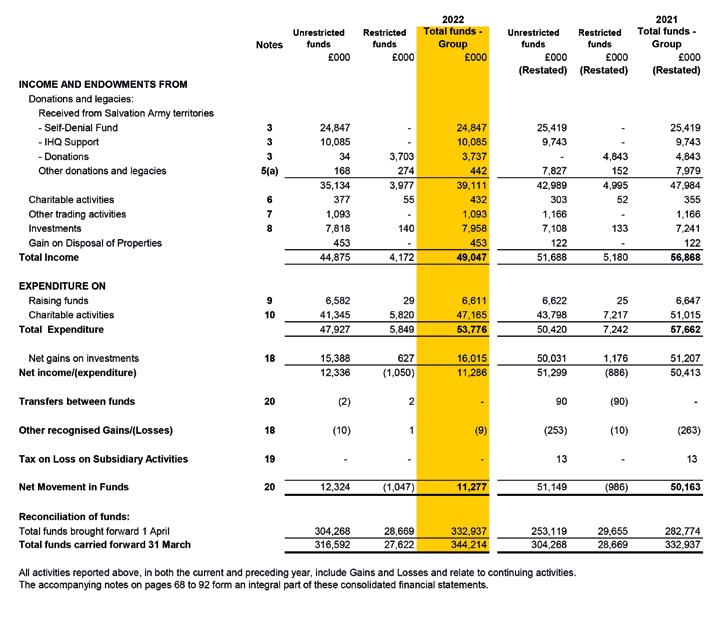
FOR THE YEAR ENDED 31 MARCH 2022

STATEMENT OF FINANCIAL ACTIVITIES (CHARITY ONLY) FOR THE YEAR ENDED 31 MARCH 2022
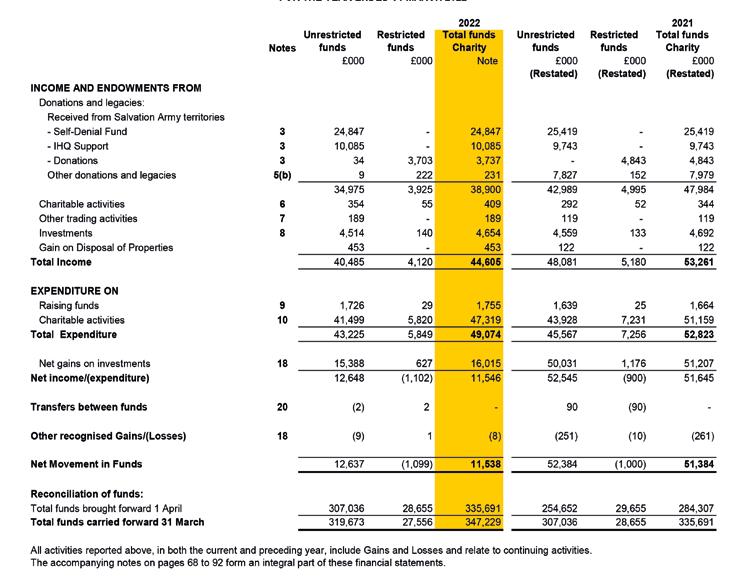

THE SALVATION ARMY INTERNATIONAL TRUST

THE SALVATION ARMY INTERNATIONAL TRUST
FOR THE YEAR ENDED 31 MARCH 2022

THE SALVATION ARMY INTERNATIONAL TRUST
NOTES TO THE CONSOLIDATED ACCOUNTS FOR THE YEAR ENDED 31 MARCH 2022


NOTES TO THE CONSOLIDATED ACCOUNTS FOR THE YEAR ENDED 31 MARCH 2022

THE SALVATION ARMY INTERNATIONAL TRUST FOR THE YEAR ENDED 31 MARCH 2022 (Continued)

THE SALVATION ARMY INTERNATIONAL TRUST
NOTES TO THE CONSOLIDATED ACCOUNTS

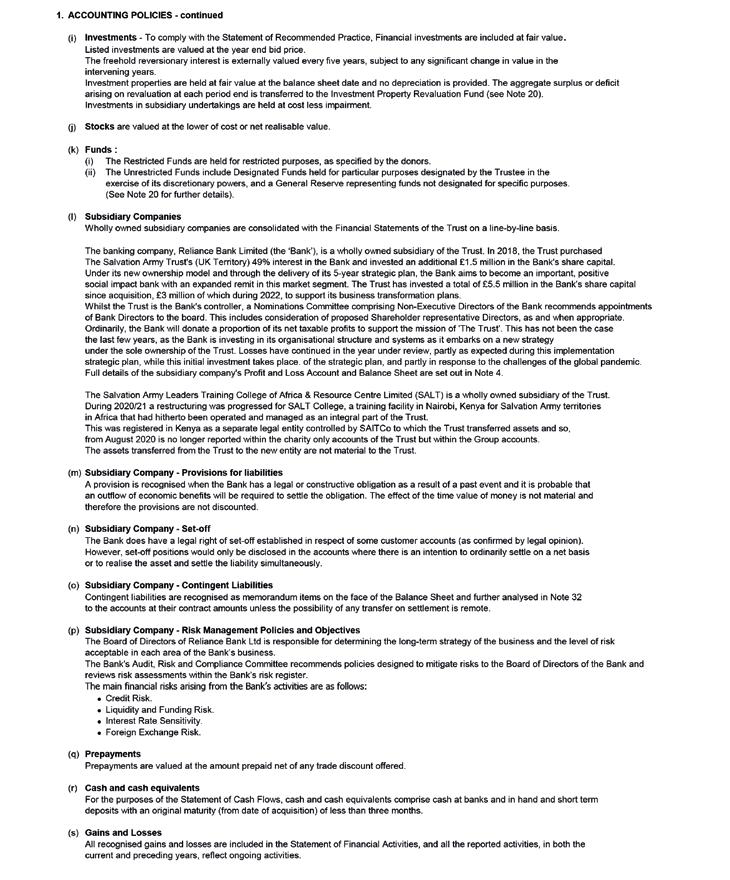
FOR THE YEAR ENDED 31 MARCH 2022
FOR THE YEAR ENDED 31 MARCH 2022 (Continued)
NOTES TO THE CONSOLIDATED ACCOUNTS FOR THE YEAR ENDED 31 MARCH 2022

THE SALVATION ARMY INTERNATIONAL TRUST FOR THE YEAR ENDED 31 MARCH 2022 (Continued)

NOTES TO THE CONSOLIDATED ACCOUNTS FOR THE YEAR ENDED 31 MARCH 2022

THE SALVATION ARMY INTERNATIONAL TRUST FOR THE YEAR ENDED 31 MARCH 2022 (Continued)

NOTES TO THE CONSOLIDATED ACCOUNTS FOR THE YEAR ENDED 31 MARCH 2022

THE SALVATION ARMY INTERNATIONAL TRUST FOR THE YEAR ENDED 31 MARCH 2022 (Continued)
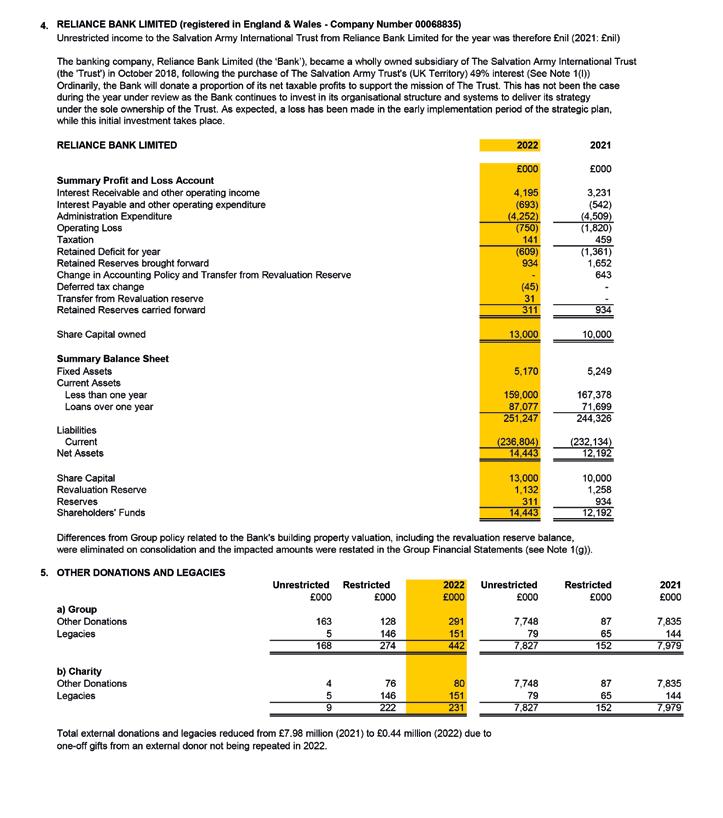
NOTES TO THE CONSOLIDATED ACCOUNTS FOR THE YEAR ENDED 31 MARCH 2022

THE SALVATION ARMY INTERNATIONAL TRUST FOR THE YEAR ENDED 31 MARCH 2022 (Continued)
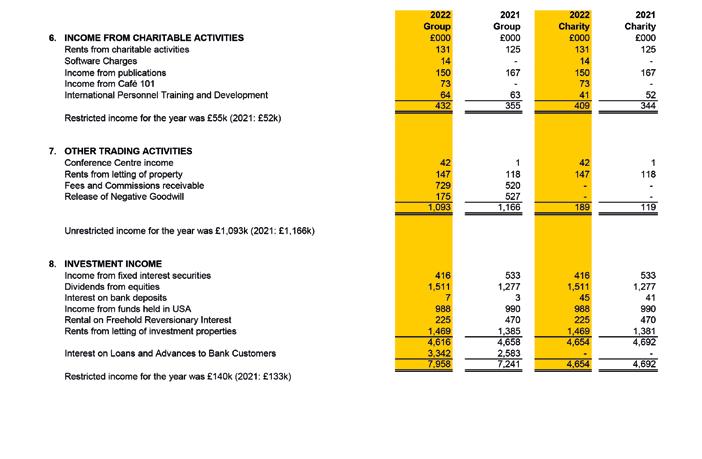
THE SALVATION ARMY INTERNATIONAL TRUST
NOTES TO THE CONSOLIDATED ACCOUNTS FOR THE YEAR ENDED 31 MARCH 2022

FOR THE YEAR ENDED 31 MARCH 2022 (Continued)
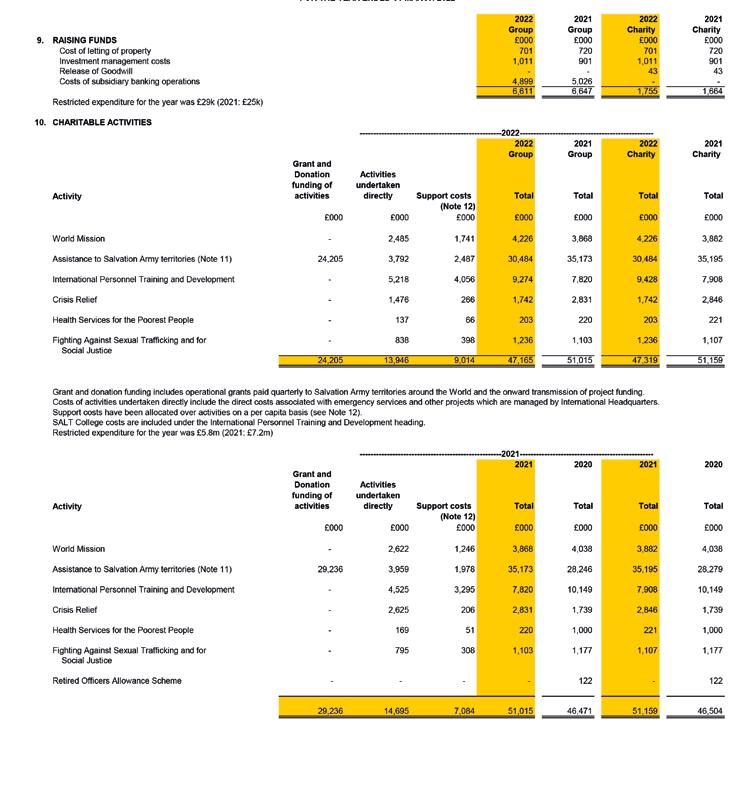
THE SALVATION ARMY INTERNATIONAL TRUST
NOTES TO THE CONSOLIDATED ACCOUNTS FOR THE YEAR ENDED 31 MARCH 2022
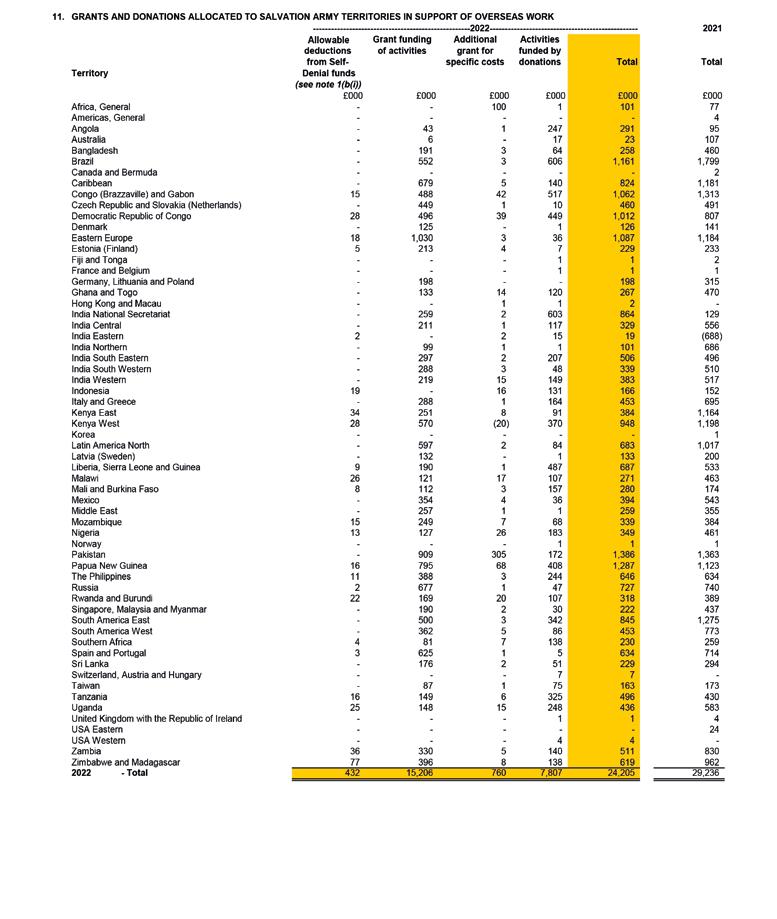
FOR THE YEAR ENDED 31 MARCH 2022 (Continued)

THE SALVATION ARMY INTERNATIONAL TRUST
NOTES TO THE CONSOLIDATED ACCOUNTS FOR THE YEAR ENDED 31 MARCH 2022
FOR THE YEAR ENDED 31 MARCH 2022 (Continued)

THE SALVATION ARMY INTERNATIONAL TRUST
NOTES TO THE CONSOLIDATED ACCOUNTS


FOR THE YEAR ENDED 31 MARCH 2022
FOR THE YEAR ENDED 31 MARCH 2022 (Continued)
NOTES TO THE CONSOLIDATED ACCOUNTS FOR THE YEAR ENDED 31 MARCH 2022

THE SALVATION ARMY INTERNATIONAL TRUST FOR THE YEAR ENDED 31 MARCH 2022 (Continued)

NOTES TO THE CONSOLIDATED ACCOUNTS FOR THE YEAR ENDED 31 MARCH 2022
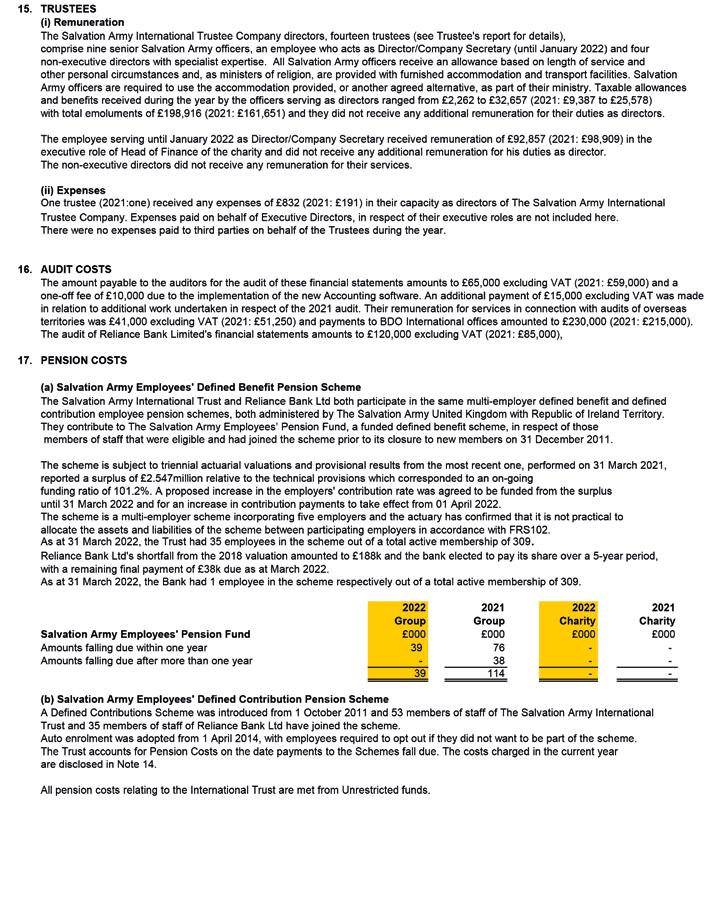
THE SALVATION ARMY INTERNATIONAL TRUST FOR THE YEAR ENDED 31 MARCH 2022 (Continued)

NOTES TO THE CONSOLIDATED ACCOUNTS FOR THE YEAR ENDED 31 MARCH 2022


THE SALVATION ARMY INTERNATIONAL TRUST FOR THE YEAR ENDED 31 MARCH 2022 (Continued)
TO THE CONSOLIDATED
FOR THE YEAR ENDED 31 MARCH 2022
THE SALVATION ARMY INTERNATIONAL TRUST
NOTES TO THE CONSOLIDATED ACCOUNTS FOR THE YEAR ENDED 31 MARCH 2022
FOR THE YEAR ENDED 31 MARCH 2022 (Continued)
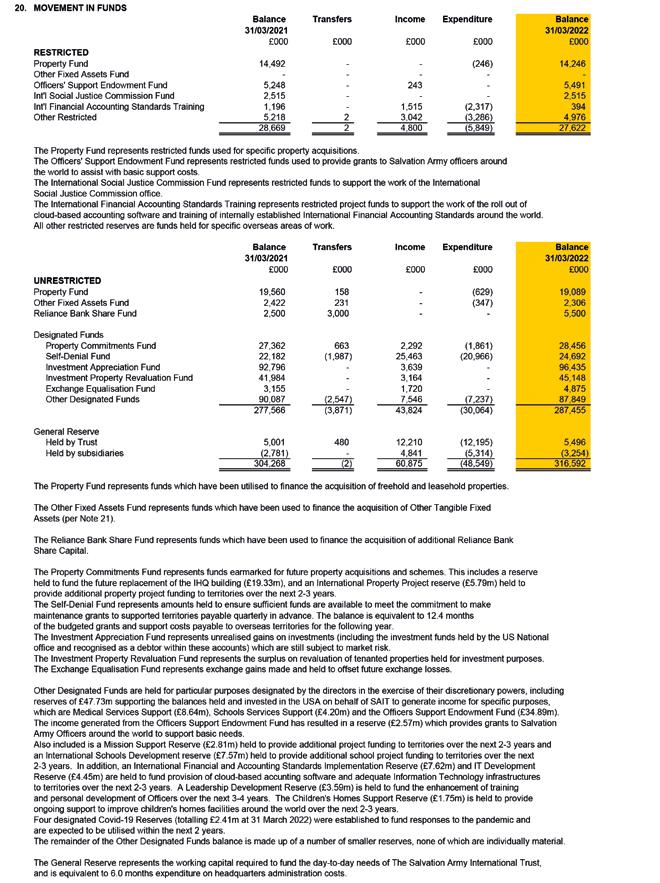
THE SALVATION ARMY INTERNATIONAL TRUST
NOTES TO THE CONSOLIDATED ACCOUNTS FOR THE YEAR ENDED 31 MARCH 2022
FOR THE YEAR ENDED 31 MARCH 2022 (Continued)

THE SALVATION ARMY INTERNATIONAL TRUST
NOTES TO THE CONSOLIDATED ACCOUNTS


FOR THE YEAR ENDED 31 MARCH 2022
FOR THE YEAR ENDED 31 MARCH 2022 (Continued)
NOTES TO THE CONSOLIDATED ACCOUNTS FOR THE YEAR ENDED 31 MARCH 2022

THE SALVATION ARMY INTERNATIONAL TRUST FOR THE YEAR ENDED 31 MARCH 2022 (Continued)

THE SALVATION ARMY INTERNATIONAL TRUST
NOTES TO THE CONSOLIDATED ACCOUNTS FOR THE YEAR ENDED 31 MARCH 2022
FOR THE YEAR ENDED 31 MARCH 2022 (Continued)
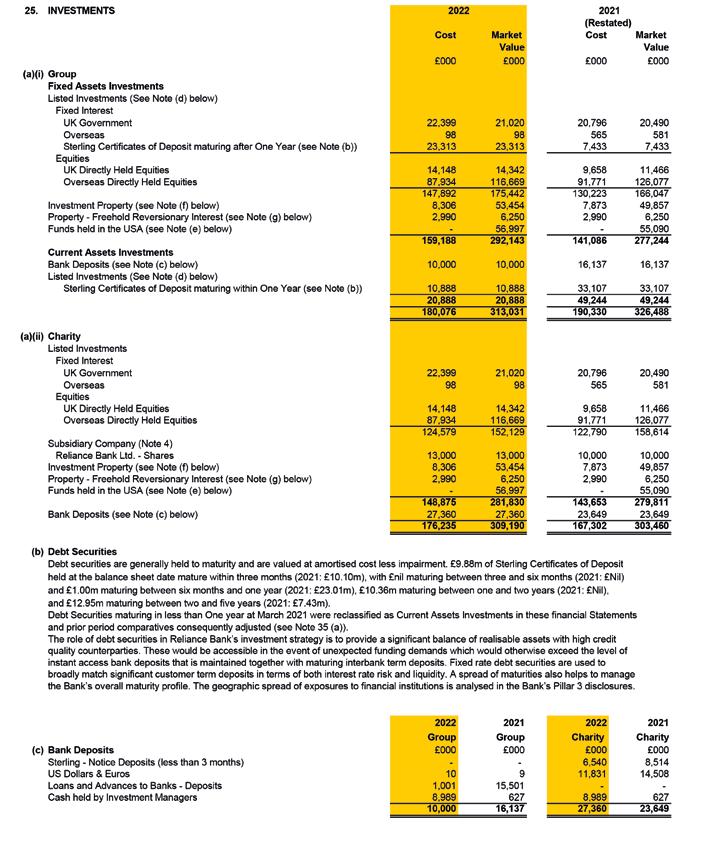
THE SALVATION ARMY INTERNATIONAL TRUST
NOTES TO THE CONSOLIDATED ACCOUNTS FOR THE YEAR ENDED 31 MARCH 2022
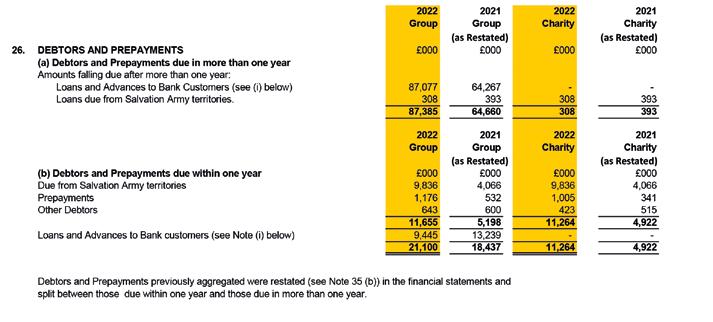
FOR THE YEAR ENDED 31 MARCH 2022 (Continued)

THE SALVATION ARMY INTERNATIONAL TRUST
NOTES TO THE CONSOLIDATED ACCOUNTS


FOR THE YEAR ENDED 31 MARCH 2022
FOR THE YEAR ENDED 31 MARCH 2022 (Continued)
THE SALVATION ARMY INTERNATIONAL TRUST
NOTES TO THE CONSOLIDATED ACCOUNTS FOR THE YEAR ENDED 31 MARCH 2022
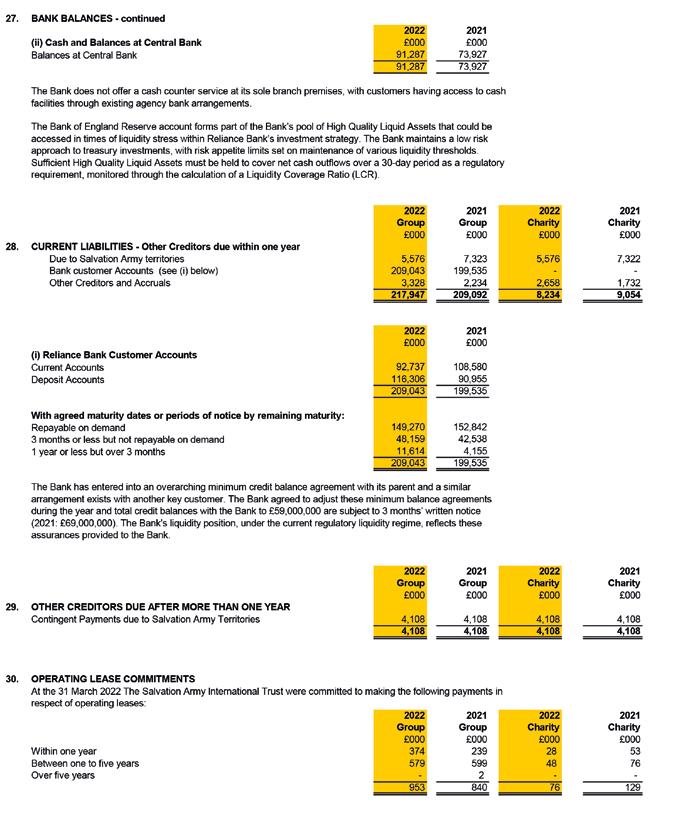
FOR THE YEAR ENDED 31 MARCH 2022 (Continued)

NOTES TO THE CONSOLIDATED ACCOUNTS FOR THE YEAR ENDED 31 MARCH 2022

THE SALVATION ARMY INTERNATIONAL TRUST FOR THE YEAR ENDED 31 MARCH 2022 (Continued)

THE SALVATION ARMY INTERNATIONAL TRUST
NOTES TO THE CONSOLIDATED ACCOUNTS FOR THE YEAR ENDED 31 MARCH 2022

FOR THE YEAR ENDED 31 MARCH 2022 (Continued)
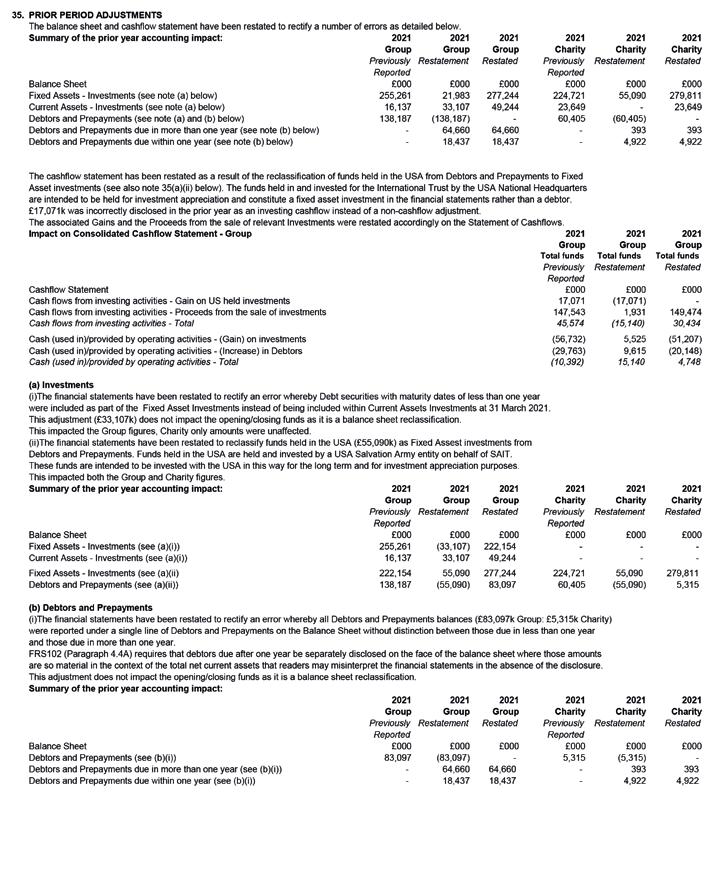
NOTES TO THE CONSOLIDATED ACCOUNTS FOR THE YEAR ENDED 31 MARCH 2022

THE SALVATION ARMY INTERNATIONAL TRUST FOR THE YEAR ENDED 31 MARCH 2022 (Continued)

DIRECT CONTRIBUTIONS FROM TERRITORIES

TOWARDS SPECIAL PROJECTS FOR THE YEAR ENDED 31 MARCH 2022

